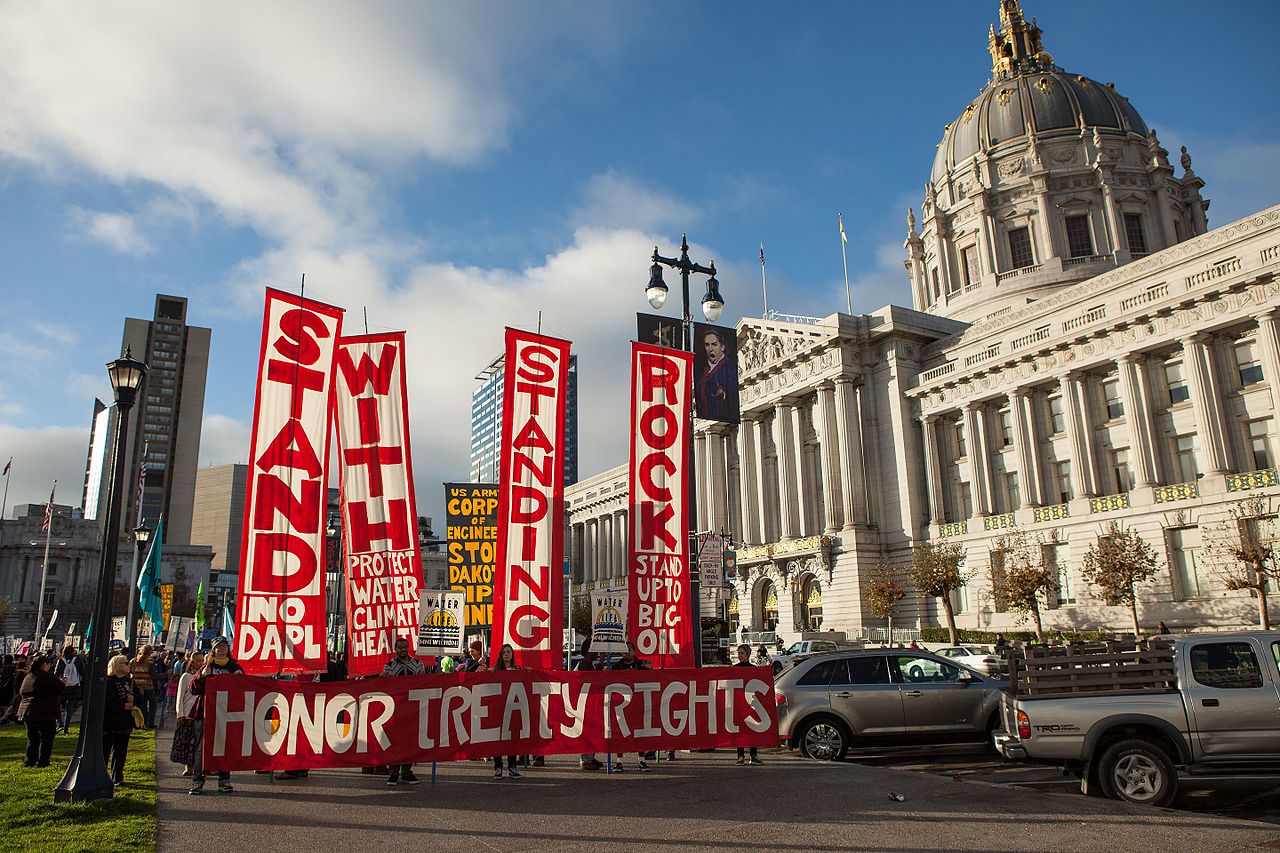
The parallel ideological priorities that co-exist within ALEC, advancing both conservative social policy and opportunities for corporate profit-making, drive its current political efforts. These objectives reflect the two central elements of ALEC’s mission: on one side, its conservative evangelical roots continue to resist social progress, while on the other, the corporate members continue to advance deregulation and privatization.
But whether motivated by corporate profit or conservative ideology, ALEC’s behind-the-scenes maneuvering consistently has a disproportionate and harmful impact on communities of color. In some areas of law, the link between corporate interests and attacks on communities of color is clear. For example, in the name of protecting profits of oil and gas companies, ALEC has sponsored so-called “critical infrastructure” bills that dramatically enhance criminal penalties for the Indigenous water protectors (and their allies) who protest construction of fossil fuel infrastructure projects. As introduced in Part I, ALEC was also critical to the proliferation of Stand Your Ground laws in state legislatures around the country, protecting NRA profits while endangering Black lives.
ALEC’s behind-the-scenes maneuvering consistently has a disproportionate and harmful impact on communities of color.
On other issues covered in this report, like voter ID and anti-Boycott, Divestment, and Sanction bills,[73] we see a modern incarnation of ALEC’s ideological fundamentalist evangelical roots. ALEC’s members rely on its powerful political platform to advance the white supremacist ideology of right-wing evangelical groups. As Weyrich sought to on racial segregation, today’s ALEC seeks not only to pass favored pieces of legislation, but to change the terms of the debate itself. By lending its political platform to the reactionary forces behind bills seeking to vilify an entire movement for human rights and re-define “antisemitism” to serve its own political ends,[74] ALEC empowers Paul Weyrich’s modern-day evangelical and fundamentalist counterparts in their quest to redefine the social order.
[73] See also initiatives like pushing for passage of Anti-Sharia bills, which, while not covered in this report, are affiliated with ALEC. These laws, in the words of the Southern Poverty Law Center, are “legally redundant efforts that foment a sensational fear of Islam and American Muslims subverting American law.” See further at: Hélène Barthélemy, “Anti-Muslim fanatic David Horowitz speaks at influential American Legislative Exchange Council,” February 5, 2018, https://www.splcenter.org/hatewatch/2018/02/05/anti-sharia-law-bills-united-states.
[74] Ed Pilkington, “Revealed: rightwing push to ban criticism of Israel on US campuses,” The Guardian, October 17, 2019, https://www.theguardian.com/us-news/2019/oct/16/conservative-activists-want-to-outlaw-antisemitism-in-public-education-why-is-that-a-bad-thing.
Part 3 of the report will detail four areas of legislation that ALEC has recently promoted or is currently championing and illustrate how each has disproportionately targeted and affected communities of color beginning with a discussion of ALEC’s involvement in providing a platform for encouraging passage of “Stand Your Ground” laws across the country. These laws can be traced back to the National Rifle Association (NRA), a corporate member of the group representing the interests of gun and ammunition manufacturers, but have been fiercely opposed by racial justice groups for the impunity they have extended to those who murder Black people.
The focus will then move to so-called voter ID laws, a modern-day reincarnation of Jim Crow voting restrictions designed to suppress the power of Black and Brown communities in the political system. These the anti-democratic measures further the beliefs of ALEC’s co-founder, Paul Weyrich, that “not everyone should vote,” perpetuating white supremacy over political power.[75]
[75] Weyrich infamously told a gathering of conservative evangelicals, “Now many of our Christians have what I call the goo-goo syndrome — good government. They want everybody to vote. I don't want everybody to vote. Elections are not won by a majority of people, they never have been from the beginning of our country and they are not now. As a matter of fact, our leverage in the elections quite candidly goes up as the voting populace goes down.” Accessible at: https://www.youtube.com/watch?v=8GBAsFwPglw.
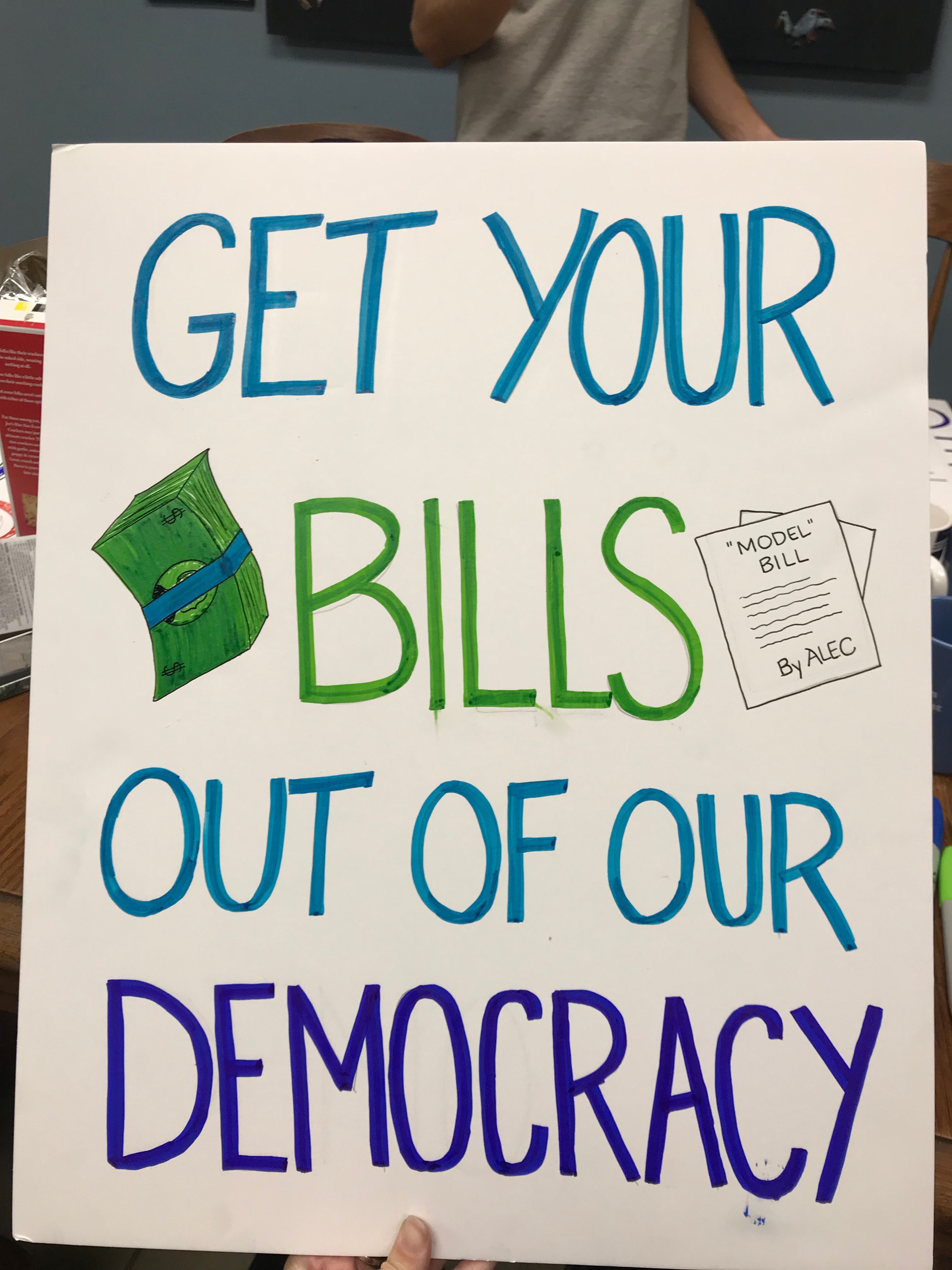
Part 3 will then consider “critical infrastructure” laws, pieces of legislation that strengthen the power of the legal system to criminalize Indigenous and allied water protectors fighting to resist the expansion of this country’s vast and dangerous oil and gas infrastructure. Conceived of by representatives of the oil and gas industry to protect corporate profits, “critical infrastructure” laws have continued this country’s long legacy of criminalizing Indigenous people who have never stopped protesting against the theft of their land, resources, and wealth, and the accumulation of power by the white elite of the U.S.
The final section of Part 3 will consider “anti-BDS laws,” which are designed to delegitimize and attack a Palestinian-led boycott movement for human rights. That ALEC is involved in supporting the passage of these laws is perhaps unsurprising given ALEC’s deep evangelical history. It was tele-evangelist Jerry Falwell, a close contemporary of ALEC founder Paul Weyrich, who said “to stand against Israel is to stand against God.” The roots of fundamentalist Christian support for Zionism stretch back to at least the writings of John Darby in the mid-1800s, and carry through to the present day, with most modern evangelicals believing that the creation of Israel is a necessary step to bringing about the second coming of Jesus Christ.[76] Hence, it is no surprise that conservative Christian evangelical groups within ALEC played an influential role in supporting passage of a set of laws designed to criminalize advocacy for Palestinian rights.
[76] Lifeway Research, “Evangelical Attitudes Towards Israel Research Study: Evangelical Attitudes Towards Israel and the Peace Process,” 2017, available at: http://lifewayresearch.com/wp-content/uploads/2017/12/Evangelical-Attitudes-Toward-Israel-Research-Study-Report.pdf.
For each area of legislation, the report will give a brief historical overview of the laws and detail the use by ALEC members of its platform to raise-awareness about and repackage emerging pro-conservative and pro-corporate issues into draft laws that are distributed to and passed through state legislatures across the country. The sections below will then examine the specific harms these laws have on communities of color.
‘Stand Your Ground’ laws
The Origin
Twenty-seven states now have a “Castle Doctrine” or “Stand Your Ground” law similar to the first one developed in Florida, SB 436, which was signed into law by Governor Jeb Bush on April 26, 2005.[77] Section 3 reads:
[77] Giffords Law Center to Prevent Gun Violence, “‘Stand Your Ground’ Laws,” webpage, https://lawcenter.giffords.org/gun-laws/policy-areas/guns-in-public/stand-your-ground-laws/#state; 30 states have some version of a “stand your ground” or “castle doctrine” law in effect, but there are differences in how the law operates depending on where the shooter is at the time (i.e. in a motor vehicle).
A person who is not engaged in an unlawful activity and who is attacked in any other place where he or she has a right to be has no duty to retreat and has the right to stand his or her ground and meet force with force, including deadly force if he or she reasonably believes it is necessary to do so to prevent death or great bodily harm to himself or herself or another or to prevent the commission of a forcible felony.[78]
[78] Hussein and Webber, “Florida’s ‘Stand Your Ground’ Statute: Self-Defense, Justifiable Use of Force, and Prosecutorial Immunity,” subsection 3 [emphasis added], http://www.husseinandwebber.com/case-work/criminal-defense-articles/floridas-stand-ground-statute/.
The law was drafted by Marion Hammer, the National Rifle Association’s (NRA) lobbyist in Florida and former president of the NRA.[79] The NRA is a long-time member of ALEC, and Hammer had developed a particularly strong reputation for influencing Florida politicians to pass legislation favorable to gun manufacturers.[80] As Paul Flemming, then-reporter for Florida Today told a media watchdog, “There is no doubt about it.… All of the gun laws that come through the Florida legislature, she writes.”[81]
[79] Joe Strupp, Media Matters for America, “Former NRA President: We Helped Draft Florida's ‘Stand Your Ground’ Law,” March 27, 2012,
[80] Mike Spies, “The N.R.A. Lobbyist Behind Florida’s Pro-Gun Policies,” The New Yorker, February 23, 2018, https://www.newyorker.com/magazine/2018/03/05/the-nra-lobbyist-behind-floridas-pro-gun-policies.
[81] Joe Strupp, Media Matters for America, “Former NRA President: We Helped Draft Florida's ‘Stand Your Ground’ Law,” March 27, 2012,
The Role of ALEC
The primary sponsors for Florida’s “Stand Your Ground” bill were ALEC members state Representative Dennis Baxley and state Senator Durell Peadon.[82] The lawmakers worked closely with Marion Hammer and the NRA to pass the law, and their partnership exemplifies both the close relationships between gun lobbyists and elected officials, and the mechanism for proliferating ALEC legislation throughout the country. In 2005, the NRA described how it utilized the ALEC platform to support wider adoption of “Stand Your Ground” laws in other states:
[82]John Nichols, How ALEC Took Florida’s ‘License to Kill’ Law National, The Nation, March 22, 2012,
Marion Hammer presented the ALEC Criminal Justice Task Force with proposed legislation based on Florida’s landmark “Castle Doctrine” law, that passed in Florida earlier this year. Her talk was well-received, and the Task Force subsequently adopted the measure unanimously. It will officially become ALEC Model Legislation in 30 days if there is no objection from the ALEC Board of Directors.[83]
[83] National Rifle Association — Institute for Legislative Action, “NRA Presents ALEC Model Legislation in Grapevine, Texas,” press release, August 12, 2005, https://www.prwatch.org/files/NRA_2005.png.
Indeed, four months after the Florida “Stand Your Ground” law was passed, the ALEC Board of Directors approved the model legislation in August 2005.[84] Furthermore, former ALEC employee and current Maryland state senator Michael Hough indicated publicly that ALEC worked with the NRA to develop the model policy, and then introduced it in states across the country. On NRA TV he stated that, “we worked with the NRA with that, that’s one of our model bills that we have states introduce.”[85]
[84] See also a subsequent ALEC public statement supporting the NRA’s assertion that “Florida’s Stand Your Ground law was the basis for the American Legislative Exchange Council’s model legislation”: American Legislative Exchange Council, “ALEC Statement on ‘Stand Your Ground’ Legislation,” March 26, 2012,
[85] Calvin Sloan, People for the American Way, “ALEC: The Hidden Player Behind ‘Stand Your Ground’ Laws,” March 21, 2012, http://www.pfaw.org/blog-posts/alec-the-hidden-player-behind-stand-your-ground-laws/.
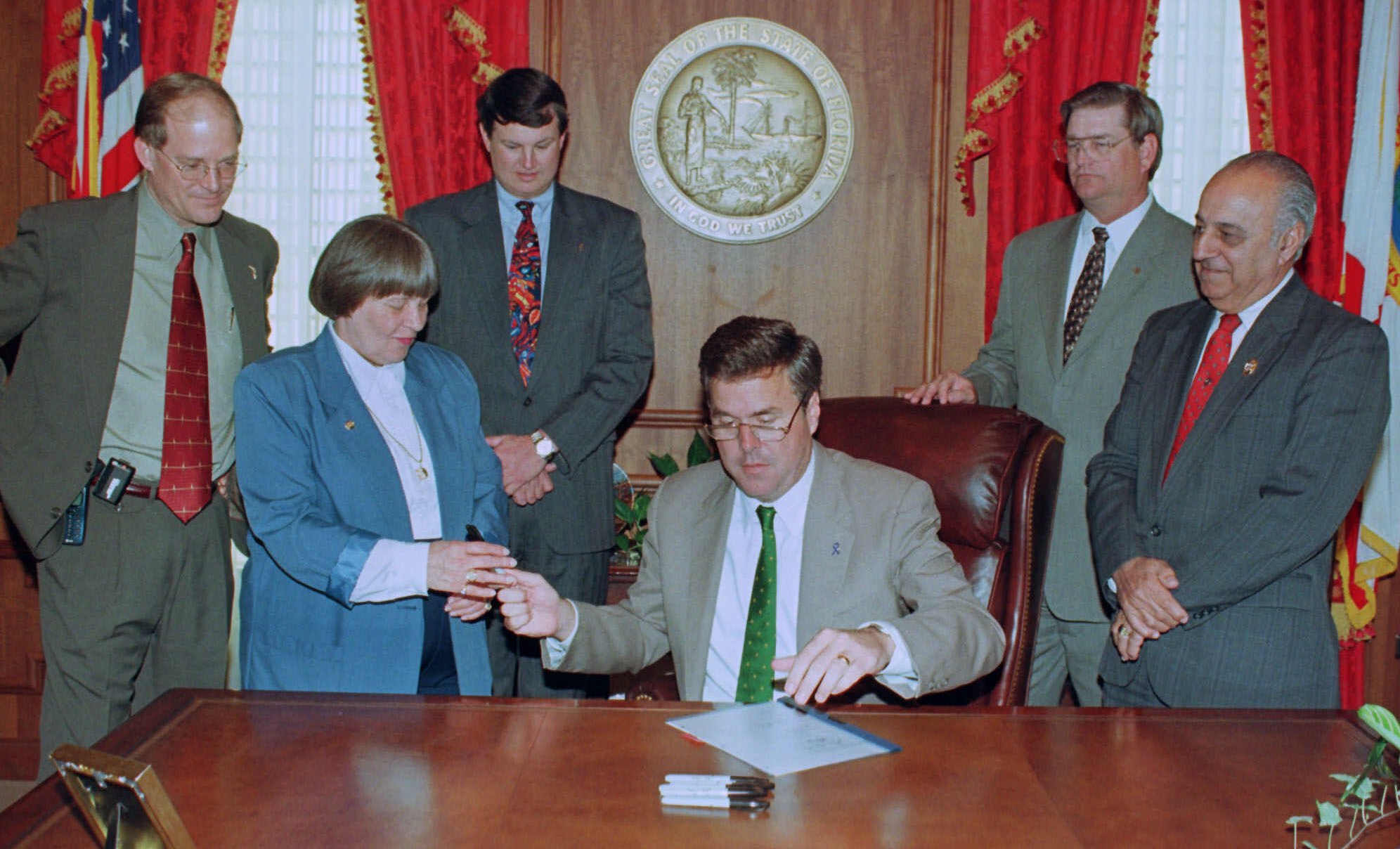
The NRA heightened its investment and support of ALEC in later years, and, according to research by Progress Florida, “The NRA co‐chaired the ALEC Public Safety and Elections Task Force from 2008 to 2011, and has made large contributions to the group – for example, in 2011, the NRA donated $25,000 to ALEC to achieve “Vice‐Chairman” level sponsorship for the annual conference.”[86]
[86] Ibid.
The NRA’s return on its investment in ALEC, and the passage of Stand Your Ground laws, comes in the form of contributions it receives from the firearms industry. A detailed report on corporate sponsorship of the NRA and found that “[c]ontributions to the NRA from the firearms industry since 2005 total between $14.7 million and $38.9 million.”[87] The report also noted that “[i]n a promotional brochure for the program, NRA Executive-Vice President Wayne LaPierre promises that the ‘National Rifle Association’s newly expanded Corporate Partners Program is an opportunity for corporations to partner with the NRA....This program is geared toward your company’s corporate interests.’” [88]
[87] Violence Policy Center, “Blood Money: How the Gun Industry Bankrolls the NRA,” April 2011, 1, http://www.vpc.org/studies/bloodmoney.pdf.
[88] Ibid.
In the year following Florida’s passage of its Stand Your Ground law, and after ALEC had approved a model policy, 13 states passed a similar version.[89] According to the National Conference of State Legislatures, “laws in at least 25 states allow that there is no duty to retreat an attacker in any place in which one is lawfully present” and “at least ten of those states include language stating one may ‘stand his or her ground.’”[90]
[89] Everytown for Gun Safety, “Shoot First Appendix,” 2015, https://everytownresearch.org/wp-content/uploads/2015/06/ShootFirst-Appendix2.pdf.
[90] National Conference of State Legislatures, “Self-Defense and ‘Stand Your Ground’,” July 27, 2018, http://www.ncsl.org/research/civil-and-criminal-justice/self-defense-and-stand-your-ground.aspx, Alabama 2006, Florida 2005, Georgia 2006, Idaho 2018, Kansas 2010, Kentucky 2006, Louisiana 2006, Oklahoma 2006, Pennsylvania 2011, and South Carolina 2006.
Stand Your Ground Laws’ Impact on People of Color
In 2012, Floridian George Zimmerman shot and killed an unarmed, 17-year-old Black teenager named Trayvon Martin. Trayvon was a student from Krop Senior High School outside Miami, and had been visiting his father in Sanford, Florida when he was killed. Zimmerman was a neighborhood watch captain for “The Retreat at Twin Lakes,” a gated community in Sanford, and was patrolling the neighborhood the night that he killed Trayvon.[91] Time magazine reported on the incident a few weeks later:
[91] CNN, “Trayvon Martin Shooting Fast Facts,” February 28, 2019, https://www.cnn.com/2013/06/05/us/trayvon-martin-shooting-fast-facts/index.html.
Martin was in the gated community with his father as they visited the home of family friends. He had gone to a nearby 7-11 for snacks and was on his way back to the house when he was spotted by Zimmerman, who called police to report a “real suspicious guy.” He told the dispatcher that Martin “looks like he’s up to no good or he’s on drugs or something.” He described Martin as having his hand on his waistband, carrying an object, and coming towards him. “And he’s a black male…Something’s wrong with him…These a**holes, they always get away.”[92]
[92] Madison Gray, “Trayvon Martin’s Killing: Was the Motive Self-Defense or Racism?” Time, March 19, 2012,
In July 2013 a jury found Zimmerman not guilty of second-degree murder or manslaughter.
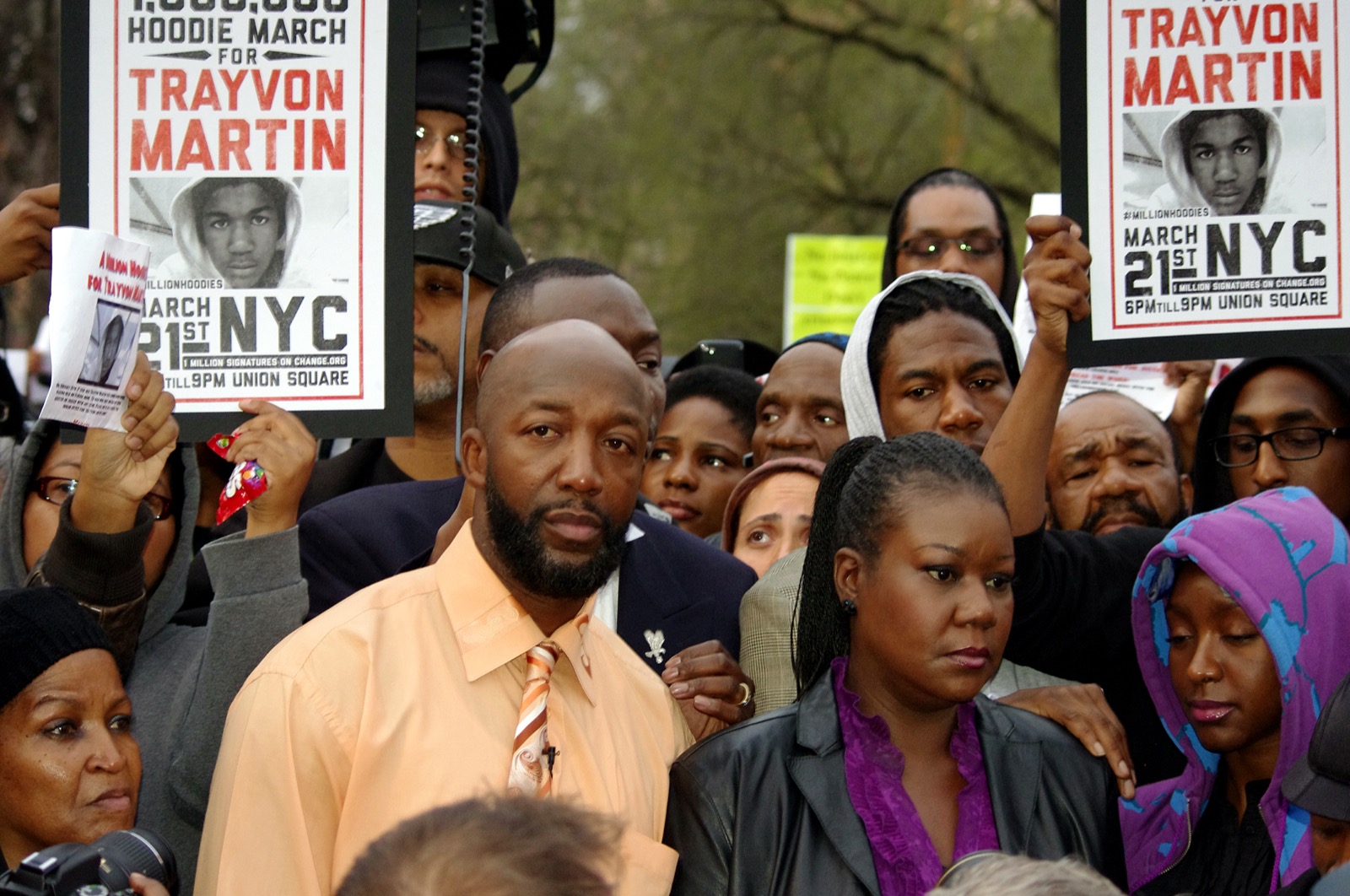
In a media interview with CNN’s Anderson Cooper after the verdict, a juror explained how Stand Your Ground had played a role in determining Zimmerman’s culpability:
COOPER: Because of the two options you had, second degree murder or manslaughter, you felt neither applied?
JUROR: Right. Because of the heat of the moment and the Stand Your Ground. He had a right to defend himself. If he felt threatened that his life was going to be taken away from him or he was going to have bodily harm, he had a right.[93]
[93] Igor Volsky, “7 Mind Blowing Moments From Zimmerman Juror B37′s First Interview,” Think Progress, July 16, 2013, https://web.archive.org/web/20130719114222/http://thinkprogress.org/politics/2013/07/16/2306901/7-mind-blowing-moments-from-zimmerman-juror-b37s-first-interview/?mobile=nc.
Since Stand Your Ground laws have become more widespread across the United States, researchers have begun to examine their impact. A widely cited 2016 study published in the Journal of the American Medical Association found that:
Since Florida’s stand your ground law took effect in October 2005, rates of homicide and homicide by firearm in the state have significantly increased; through 2014, monthly rates of homicide increased by 24.4% and monthly rates of homicide by firearm by 31.6%. These increases appear to have occurred despite a general decline in homicide in the United States since the early 1990s.[94] In contrast, rates of homicide and homicide by firearm did not increase in states without a stand your ground law (New York, New Jersey, Ohio, and Virginia), or for either suicide or suicide by firearm. Our findings support the hypothesis that increases in the homicide and homicide by firearm rates in Florida are related to the stand your ground law.[95]
[94] Pinker S. The Better Angels of Our Nature: A History of Violence and Humanity. London: Penguin; 2012.
[95] David Humphreys, Antonio Gasparrini and Douglas Wiebe, 'Evaluating the Impact of Florida’s “Stand Your Ground” Self-defense Law on Homicide and Suicide by Firearm: An Interrupted time Series Study’, Journal of the American Medical Association, Internal Medicine, January 2017, https://jamanetwork.com/journals/jamainternalmedicine/fullarticle/2582988#ioi160090r32
A 2013 study by Urban Institute examined the intersection of race and justifiable homicide rates in states with and without stand your ground laws. The study found that:
Overall, the rate of justifiable homicides is almost six times higher in cases with attributes that match the Martin case. Racial disparities are much larger, as white-on-black homicides have justifiable findings 33 percentage points more often than black-on-white homicides. Stand your ground [SYG] laws appear to exacerbate those differences, as cases overall are significantly more likely to be ruled justified in SYG states than in non-SYG states.[96]
[96] John K. Roman, “Race, Justifiable Homicide, and Stand Your Ground Laws: Analysis of FBI Supplementary Homicide Report Data,” Urban Institute, July 2013, 9, https://www.urban.org/sites/default/files/publication/23856/412873-Race-Justifiable-Homicide-and-Stand-Your-Ground-Laws.PDF.
The study noted that, “with respect to race, controlling for all other case attributes, the odds that a white-on-black homicide is found justified is 281 percent greater than the odds a white-on-white homicide is found justified. By contrast, a black-on-white homicide has barely half the odds of being ruled justifiable relative to white-on-white homicides.”[97]
[97] Ibid, 9.
Voter ID bills
The Origin
Measures to disenfranchise people of color abound in U.S. history. For example, strategies by white supremacists, such as administering reading tests to would-be Black voters, have been in existence since the beginning of the Jim Crow era.
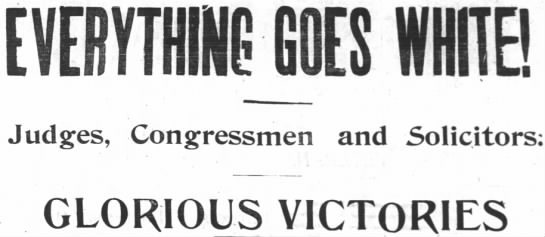
In a 1940 address to union workers, President Roosevelt stated that “there are some political candidates who think that they may have a chance of election, if only the total vote is small enough.”[98]
[98] Franklin D. Roosevelt, “Campaign dinner address of Franklin Delano Roosevelt (the Fala speech),” September 23, 1944, https://www.wyzant.com/resources/lessons/history/hpol/fdr/fala/.
In the wake of the controversial 2000 U.S. presidential election where, by one estimate, almost two million votes were disqualified,[99] former presidents Jimmy Carter and Gerald Ford formed the National Commission on Federal Election Reform (known also as the ‘Carter-Ford Commission’), with various recommendations, one of which was a voter ID requirement. Federal legislation followed in the form of the ‘Help America Vote Act’ (HAVA) in 2002, which included a voter ID requirement for first-time voters.[100] Following the 2004 presidential election, former President Carter again established a commission to examine ways of further amending the electoral voting system, this time together with former Secretary of State James A. Baker III. In 2005, their commission issued a report entitled “Building Confidence in U.S. Elections.”[101]
[99] Stefan Lovgren, “Are Electronic Voting Machines Reliable?” National Geographic News, November 1, 2004, https://web.archive.org/web/20050226083314/http://news.nationalgeographic.com/news/2004/11/1101_041101_election_voting.html.
[100] Help America Vote Act of 2002, H.R. 3295 (107th U.S. Cong.), January 23, 2002, https://www.eac.gov/assets/1/6/HAVA41.PDF.
[101] Center for Democracy and Election Management, American University, “Building Confidence in U.S. Elections: Report of the Commission on Federal Election Reform,” September 2005, https://www.eac.gov/assets/1/6/Exhibit%20M.PDF.
The co-chairs of the report justified the need for further reforms by noting that, “many Americans thought that one report — the Carter-Ford Commission — and one law — the Help America Vote Act of 2002 (HAVA) — would be enough to fix the system. It isn’t.” As such, they said, “we are recommending a photo ID system for voters designed to increase registration with a more affirmative and aggressive role for states in finding new voters and providing free IDs for those without driver’s licenses. The formula we recommend will result in both more integrity and more access.”[102]
[102] Ibid.
One commissioner, Professor Spencer Overton, strongly disagreed with the findings of the Carter-Baker 2005 Commission he was a part of. Overton noted that the voter ID recommendation is “more extreme than any ID requirement adopted in any state to date…. The existing evidence suggests that the type of fraud addressed by photo ID requirements is extraordinarily small and that the number of eligible citizens who would be denied their right to vote as a result of the Commission's ID proposal is exceedingly large.” On procedural issues Commissioner Overton raised his dissent by stating that the “commission's reliance on anecdotes and political sound bites — rather than empirical data, testimony by top experts, and rigorous analysis — undermines its credibility.”[103]
[103] Commissioner Spencer Overton, “Dissenting Statement” in response to report by Commission on Federal Election Reform, November 2005,
In the 2006 U.S. midterm federal elections, Democrats made significant advances, gaining control of the House and Senate. In the aftermath, Republicans alleged that “voter fraud” played a role in delivering election wins for the Democrats. Royal Masset, the former political director for the Republican Party of Texas and skeptic of the need for voter ID laws, informed a reporter for the Houston Chronicle that:
We fulfilled our conservative agenda. To appear new we took more and more extreme positions. We became arrogant and self righteous… It’s almost a religious part of the Republican canon that Democrats are stealing these elections. It’s a lie. It’s not true. It does not exist. I must have gotten 200 calls from people who wanted a criminal investigation of so-and-so because they lost by 100 votes and were sure there was fraud. They could never prove anything.[104]
[104] R.G. Ratcliffe, “Voter fraud in Texas: ‘It’s a lie.’” Houston Chronicle, May 17, 2007,
The results of an investigation launched by the U.S. Department of Justice between 2002 and 2005 found almost no evidence at all to substantiate the long-held conspiracy theory of voter fraud that Republican politicians have repeated ad nauseum to justify the need for voter ID laws.[105] Republicans’ insistence on the presence of voter fraud only increased following the 2008 election of President Barack Obama.
[105] Adam Gitlin and Wendy R. Weiser, Brennan Center, “The Justice Department’s Voter Fraud Scandal: Lessons,” Brennan Center for Justice at New York University School of Law, 2017, https://www.brennancenter.org/sites/default/files/publications/Justice_Department_Voter_Fraud_Scandal_Lessons.pdf; Eric Lipton and Ian Urbina, “In 5-Year Effort, Scant Evidence of Voter Fraud,” The New York Times, April 12, 2007, https://www.nytimes.com/2007/04/12/washington/12fraud.html.
The Role of ALEC
In June 2009, ALEC’s publication Inside ALEC ran a story called “Preventing Voter Fraud,” detailing what voter ID bills should include to survive constitutional challenges. The guidelines were based on the 2005 Carter-Baker Commission and the Supreme Court findings in Crawford v. Marion County Election Board, a case involving a dispute over Indiana’s 2005 voter ID law.[106] ALEC stressed in its publication that to“improve the chances of a law being upheld in court,” voter ID bills should include distribution of free voter ID cards, availability of provisional ballots as well as strong promotion of the new law and comprehensive distribution of ID cards. These elements were incorporated into ALEC’s “Taxpayer and Citizen Protection Act” which was drafted by its Criminal Justice and Homeland Security Task Force and approved by ALEC’s Board of Directors in June 2008.[107] At In August 2009, ALEC held its annual meeting, and the ALEC Board of Directors approved ALEC’s “Voter ID Act,” produced by the ALEC Task Force on Public Safety and Elections.[108] These pieces of ALEC model legislation contain many provisions, but essentially the first requires voters to demonstrate U.S. citizenship prior to voting or registering to vote, and the second requires all voters to show certain types of ID prior to voting.
[106] Stephen Elzinga, “The Challenge of Photo ID: Can Legislation Prevent Election Fraud without Disenfranchising Voters?” Inside ALEC, June 2009, 14,
[107] Center for Media and Democracy, “Taxpayer and Citizen Protection Act,” annotated by ALEC Exposed, https://www.alecexposed.org/w/images/f/f6/7K12-Taxpayer_and_Citizen_Protection_Act_Exposed.pdf.
[108] Center for Media and Democracy, “Voter ID Act,” annotated by ALEC Exposed, https://www.alecexposed.org/w/images/d/d9/7G16-VOTER_ID_ACT_Exposed.pdf.
Between 2008-2010, the years immediately following the U.S. Supreme Court decision in Crawford v. Marion County Election Board, no state passed a strict voter ID law requiring photo identification (although Oklahoma, Utah, and Idaho passed laws with what the non-partisan National Conference of State Legislatures calls “non-strict, non-photo ID requirement”).[109] However, when Republicans gained full control of an additional 11 state legislatures in the 2010 midterm elections, ALEC moved fast. In 2011, five strict photo ID laws and one non-strict law passed through state legislatures — all Republican controlled and all sponsored by ALEC-member lawmakers.[110] Others followed in 2012 and 2013, but the pace has since slowed.[111] All told, 35 states now have some form of voter ID law in effect.[112]
[109] Non-strict means voters can still cast a ballot without ID but may need to sign an affidavit, or some other form of verification will suffice. Strict requirement means voters must vote using a provisional ballot and undertake a second step of verification after they vote for it to count. See: Wendy Underhill, National Conference of State Legislators, “Voter Identification Requirements | Voter ID Laws,” Janaury 17, 2019,
[110] Mississippi (Senator Joey Fillingane), Kansas (Rep. Steve Brunk, Re.p. Lance Kinzer, Rep. Marvin Kleeb, and Rep. Peggy Mast), South Carolina (Rep. Liston Barfield), Tennessee (Rep. Curry Todd), Texas (Rep. Tom Craddick), and Wisconsin (Rep. Robin Vos, Rep. Scott Fitzgerald). See Tobin Van Ostern, “New Evidence of ALEC Connections in All Successful Voter ID Legislation,” Generation Progress, September 8, 2011, https://genprogress.org/new-evidence-of-alec-connections-in-all-successful-voter-id-legislatio/ and National Conference of State Legislators, “Voter ID History,” May 31, 2017, http://www.ncsl.org/research/elections-and-campaigns/voter-id-history.aspx.
[111] National Conference of State Legislators, “Voter ID History.”
[112] Wendy Underhill, National Conference of State Legislators, “Voter Identification Requirements | Voter ID Laws,” Janaury 17, 2019, http://www.ncsl.org/research/elections-and-campaigns/voter-id.aspx.
Voter ID Laws’ Impact on People of Color
"I want to see my vote counted. Let me be there. I wanna be there. I want to see that," 78-year-old Alberta Currie, a Black woman from Hope Mills in North Carolina, told a reporter in 2013.[113] At the time, the Republican-controlled legislature of North Carolina had recently passed a law, SL 2013-381 (also referred to as House Bill 589, before it was amended and passed in the NC Senate),[114] aimed at restricting the ability of people of color to vote. In the phrasing used by the U.S. Court of Appeals for the Fourth Circuit, “we can only conclude that the North Carolina General Assembly enacted the challenged provisions of the law with discriminatory intent”. [115]
[113] NPR, “In Rural N.C. New Voter ID Law Awakens Some Old Fears,” August 16, 2013, https://www.npr.org/2013/08/16/212664895/in-rural-n-c-new-voter-id-law-awakens-some-old-fears.
[114] General Assembly of North Carolina, “Session Law 2013-381, House Bill 589,” Session 2013,
[115] N.C. State Conference of the NAACP v. Patrick McCrory, United States Court of Appeals for the Fourth Circuit, No. 16-1468, 11,
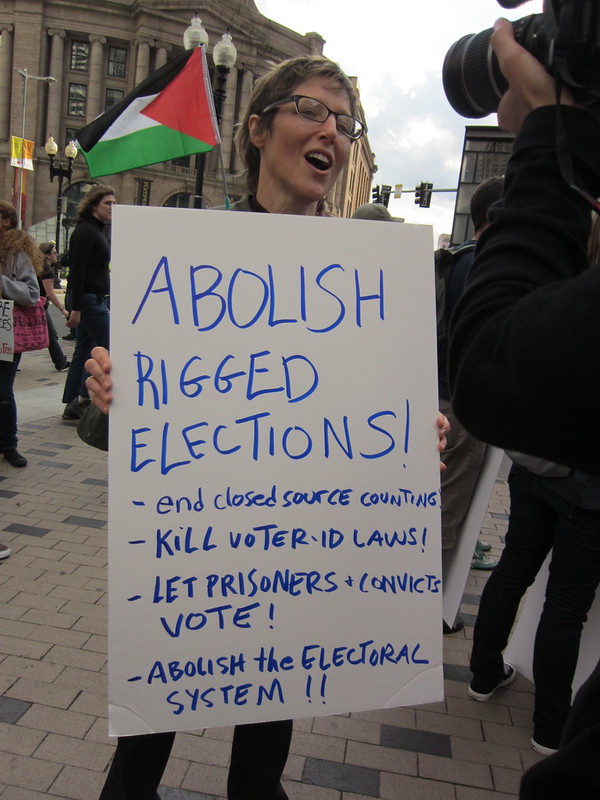
All four of the principal lawmakers who sponsored the bill in the North Carolina Legislature have been involved in ALEC, three of them as active members of ALEC Task Forces.[116]
[116] General Assembly of North Carolina, Session Law 2013-381, House Bill 589, Session 2013,
The “challenged provisions” of the new law, “required in-person voters to show certain photo IDs, beginning in 2016, which African Americans disproportionately lacked, and eliminated or reduced registration and voting access tools that African Americans disproportionately used.”[117]
[117] N.C. State Conference of the NAACP v. Patrick McCrory, United States Court of Appeals for the Fourth Circuit , No. 16-1468, 14, http://pdfserver.amlaw.com/nlj/7-29-16%204th%20Circuit%20NAACP%20v%20NC.pdf.
One of those “voting access tools” was early voting. North Carolina’s law cut the amount of time available for early voting, from 17 days to 10 days, and required all voters to provide one of a group of state-issued forms of ID prior to voting. Early voting is particularly popular among rural Black voters in North Carolina. Albert Currie and the members of her small church in Hope Mills relied on her community church’s effort to provide transport to the voting booth on the first Sunday of early voting. As the pastor of the New Oxley Hill Baptist Church in Merry Hill, N.C. reported, “many of these persons don't have cars. They can't afford automobiles.”[118] Elaborating on the objective of the North Carolina legislature to restrict early voting by a week, longtime Republican consultant Carter Wrenn told the Washington Post, “of course it’s political. Why else would you do it? … Look, if African Americans voted overwhelmingly Republican, they would have kept early voting right where it was.”[119] Another Republican official also provided insight into the intent behind the voter ID feature of the law. Don Yelton, Republican precinct chair, stated that this requirement of the law would “disenfranchise some of [Democrats’] special voting blocks…. That within itself is the reason for the photo voter ID. Period. End of discussion.”[120]
[118] Ailsa Chang, In Rural N.C., New Voter ID Law Awakens Some Old Fears, National Public Radio, August 16, 2013,
[119] William Wan, “Inside the Republican creation of the North Carolina voting bill dubbed the ‘monster’ law,” September 2, 2016, https://www.washingtonpost.com/politics/courts_law/inside-the-republican-creation-of-the-north-carolina-voting-bill-dubbed-the-monster-law/2016/09/01/79162398-6adf-11e6-8225-fbb8a6fc65bc_story.html?utm_term=.931086518879.
[120] N.C. State Conference of the NAACP v. Patrick McCrory, United States Court of Appeals for the Fourth Circuit, No. 16-1468, 47, http://pdfserver.amlaw.com/nlj/7-29-16%204th%20Circuit%20NAACP%20v%20NC.pdf.
The U.S. Court of Appeals for the Fourth Circuit, in finding that the law was specifically designed to “target African Americans with almost surgical precision,” cited the requests Republican officials had made of the North Carolina elections board in the months leading up to the passage of the bill through the legislature:
“Prior to and during the limited debate on the expanded omnibus bill, members of the General Assembly requested and received a breakdown by race of DMV-issued ID ownership, absentee voting, early voting, same-day registration, and provisional voting (which includes out-of-precinct voting). This data revealed that African Americans disproportionately used early voting, same-day registration, and out-of-precinct voting, and disproportionately lacked DMV-issued ID. Not only that, it also revealed that African Americans did not disproportionately use absentee voting; whites did. SL 2013-381 drastically restricted all of these other forms of access to the franchise, but exempted absentee voting from the photo ID requirement. In sum, relying on this racial data, the General Assembly enacted legislation restricting all — and only — practices disproportionately used by African Americans.[121]
[121] Ibid, 48.
“...white registered voters are significantly more likely to possess a voter ID than African-American or Hispanic voters.”
The targeting of African Americans that took place in North Carolina has happened elsewhere. In 2011, Texas passed a voter ID law, S.B. 14, which required voters to show one of six forms of government-issued photo identification in order to vote: a state driver’s license or ID card, a concealed handgun license, a U.S. passport, a military ID card, or a U.S. citizenship certificate with a photo. A study by political scientists Eitan Hersh and Stephen Ansolabehere found that “white registered voters are significantly more likely to possess a voter ID than African-American or Hispanic voters.”[122] Commenting to a Tufts University magazine about the study, Hersh noted that “in the last decade, states have been changing rules about registration, early voting, and voter ID…. Voter ID is particularly controversial, because some of these laws seem to have been passed into law with a discriminatory intent.”[123] Hersh has served as an expert witness for the Department of Justice in litigation filed to challenge S.B. 14. Similarly, a 2018 study by Phoebe Henninger, Marc Meredith, and Michael Morse found that, based on data from Michigan, “non-white voters are between 2.5 and 6 times more likely than white voters to lack photo ID.”[124]
[122] Stephen Ansolabehere and Eitan D. Hersh, “ADGN: An Algorithm for Record Linkage Using Address, Date of Birth, Gender, and Name,” Statistics & Public Policy 4, November 16, 2017,
[123] Taylor McNeil, “Proving Voter ID Law’s Discriminating Intent,” Tufts Now, January 23, 2018, https://now.tufts.edu/articles/proving-voter-id-law-s-discriminating-intent.
[124] Phoebe Henninger, Marc Meredith, and Michael Morse, “Who Votes Without Identification? Using Affidavits from Michigan to Learn About the Potential Impact of Strict Photo Voter Identification Laws,” July 1, 2018), https://ssrn.com/abstract=3205769.
Anti-Boycott, Divestment, and Sanctions Bills
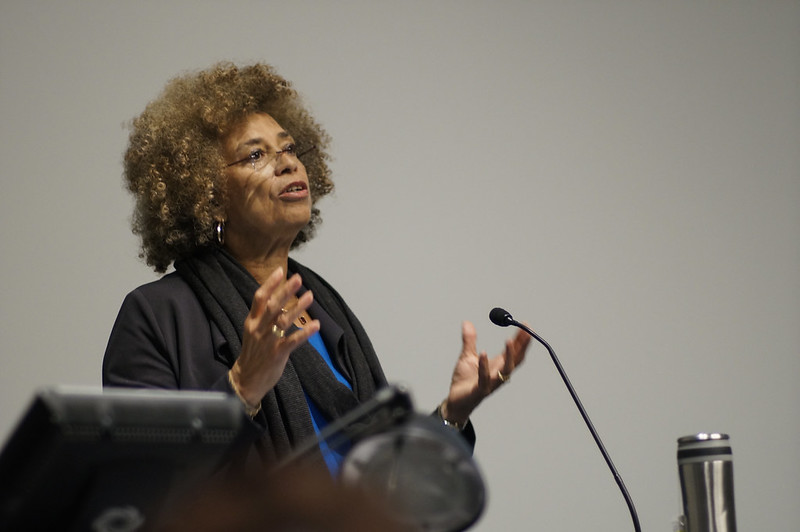
The Origin
In 2005, as part of the justice movement for Palestinian liberation and in light of a counterproductive peace process, Palestinian civil society launched a call for global solidarity to pressure the state of Israel to comply with international law and its human rights obligations to Palestinians. Hundreds of Palestinian organizations, individuals, and political parties called on the international community to commit to broad boycotts, divestment initiatives , embargoes, and sanctions (similar to those applied to South Africa during the apartheid era) to be levied against Israel “for the sake of justice and genuine peace.”[125]
[125] “Palestinian Civil Society Call for BDS,” bdsmovement.net, July 9, 2005
The call for boycott, divestment, and sanctions (BDS) urged the international community to maintain this pressure until Israel meets its obligations under international law by “1. Ending its occupation and colonization of all Arab lands and dismantling the [Separation] Wall; 2. Recognizing the fundamental rights of the Arab-Palestinian citizens of Israel to full equality; and 3. Respecting, protecting and promoting the rights of Palestinian refugees to return to their homes and properties as stipulated in UN resolution 194.”
In the intervening decade, the international solidarity movement for Palestinian rights has grown exponentially, drawing particular strength from student organizers on college campuses across the country.[126] The growth of the movement for justice in Palestine has also coincided with a renewed commitment across social justice struggles to the praxis of solidarity and what Dr. Angela Davis calls the “indivisibility of justice.”[127] In response to this surge in activsim and organizing, state and local governments across the United States have responded by cracking down on the right to protest and boycott Israel’s policies, as well as to speak openly about Palestinian human rights.[128] Many such measures mention the boycott of Israel and the BDS movement by name.
[126]See generally: Palestine Legal and the Center for Constitutional Rights, “The Palestine Exception to Free Speech: A movement under attack in the U.S.,” https://ccrjustice.org/the-palestine-exception.
[127] Niraj Chokshi, “Angela Davis Says She’s ‘Stunned’ After Award Is Revoked Over Her Views on Israel,” The New York Times, January 8, 2019,
[128] See generally: Palestine Legal and the Center for Constitutional Rights, “The Palestine Exception to Free Speech: A movement under attack in the U.S.”
In May 2015, the state legislature of Illinois broke ground when it unanimously passed the first state law to use the machinery of government to explicitly punish boycotts in support of Palestinian rights. The law established a blacklist of foreign companies that engage in a boycott of Israel, and divested public employees’ pension funds from those companies.[129][130] Governor Bruce Rauner signed the bill into law in July of that year.
[129] Illinois Senate Bill 1761, 99th General Assembly, 2015-2016, https://legiscan.com/IL/votes/SB1761/2015; Palestine Legal, “Illinois Governor Signs Anti-BDS Bill Into Law,” July 24, 2015, https://palestinelegal.org/news/2015/7/24/illinois-governor-signs-anti-bds-bill-into-law?rq=illinois.
[130] Ironically/notably, the state mimicked the tactic of “divestment,” borrowing one of the three pillars of the BDS movement.
At the time, it was widely covered in the media that the Jewish United Fund (JUF) was central to generating political support for the bill.[131] In its own statement, JUF noted that its Associate Vice President for Government Affairs, Suzanne Strassberger, “worked closely with the sponsors in Springfield [the state capital of Illinois] to move the legislation forward,” and, “in addition to lobbying in Springfield, JUF helped mobilize voter outreach to legislators.”[132] The support was acknowledged and appreciated by Governor Rauner's political aides: “JUF played a critical role in the passage of this important legislation,” said Richard Goldberg, the governor’s deputy chief of staff for legislative affairs, who noted that the governor appreciated “JUF's strong partnership in combating BDS.”[133] The JUF president added, “We anticipate that this legislation will become a model for similar action in many other states.”
[131] JUF News, Jewish United Fund, “Illinois' Anti-BDS legislation draws international news coverage,” May 21, 2015, https://www.juf.org/news/local.aspx?id=434560.
[132] JUF News, Jewish United Fund, “Illinois Passes Historic Anti-BDS Bill,” May 21, 2015,
[133] Ibid.
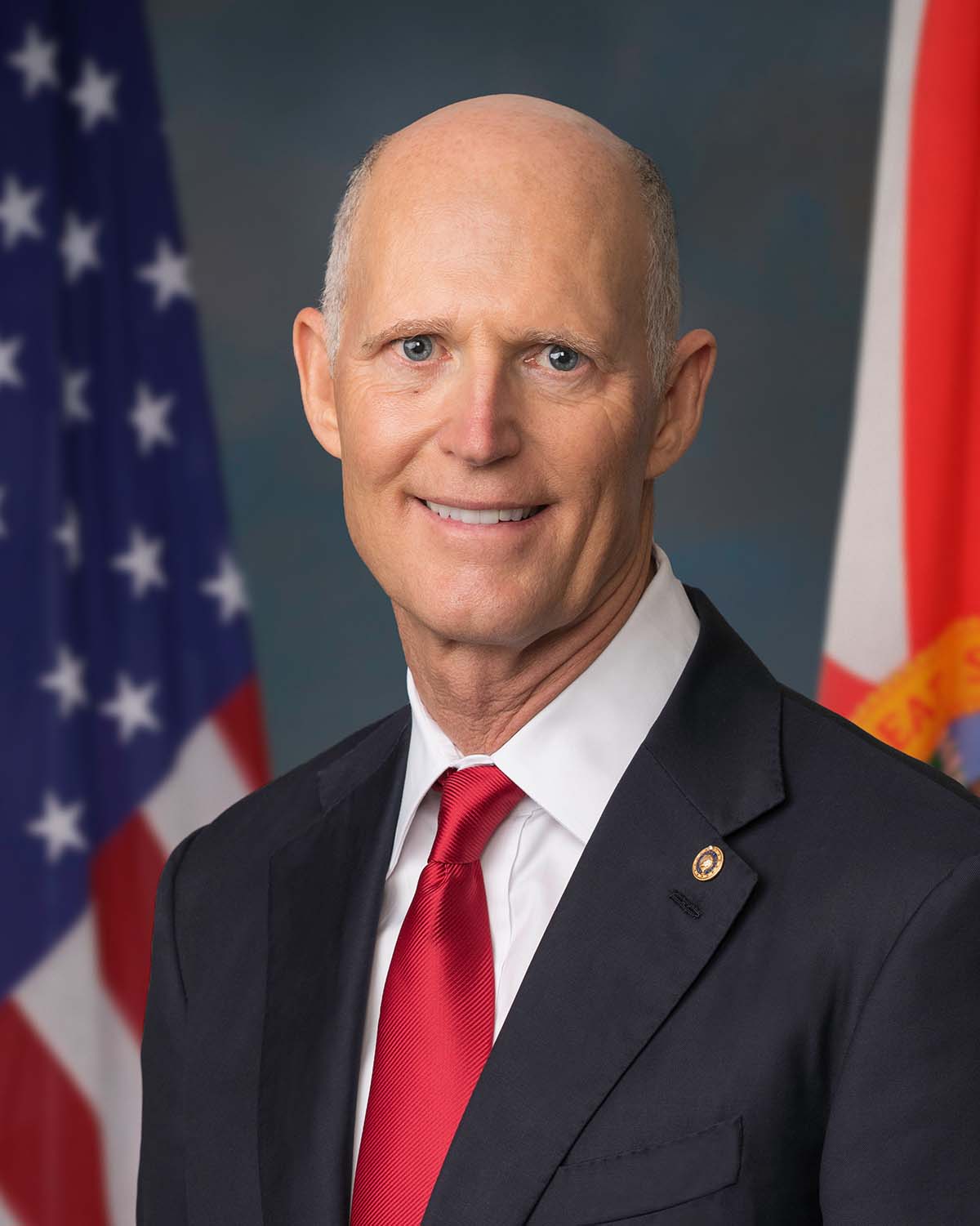
In the following months, many more state legislatures followed suit, drawing from a set of identical tactics to retaliate against business entities that engaged in the boycott of Israel. In March 2016, Florida Governor Rick Scott signed into law a measure both divesting public pensions from, and prohibiting public entities from entering into certain contracts with, companies that boycott Israel, in addition to creating a publicly available blacklist.[134] That same month, the governor of Colorado signed a law divesting public pensions from companies that boycott Israel.[135] Also in March 2016, the governor of Arizona signed into law a measure divesting public pensions from companies that boycott Israel and prohibiting public entities from entering into contracts with such companies.[136]
[134] Yair Rosenberg, “South Carolina Passes anti-BDS Bill,” Tablet, June 5, 2015, https://www.tabletmag.com/scroll/191437/south-carolina-passes-anti-bds-bill.
[135] House Bill 16-1284, State of Colorado, Seventieth General Assembly, Second Regular Session, http://www.leg.state.co.us/clics/clics2016a/csl.nsf/fsbillcont3/FFEE6B72C4AB699C87257F240063F4A6?open&file=1284_rer.pdf.
[136] HB 2617, State of Arizona, House of Representatives, Fifty-Second Legislature, Second Regular Session, 2016, https://www.azleg.gov/legtext/52leg/2r/bills/hb2617p.pdf.
Later that year, the Ohio state legislature also prohibited public entities from entering into contracts with companies that boycott Israel.[137] The Indiana state legislature passed — and then-Governor Mike Pence signed into law — a provision prohibiting public entities from doing business with companies that boycott Israel and also creating a blacklist.
[137] “Ohio Gov. John Kasign Signs state anti-BDS law,” Jewish Telegraphic Agency, December 20, 2016, https://www.jta.org/2016/12/20/united-states/ohio-gov-john-kasich-signs-state-anti-bds-law.
By April 2019, according to Palestine Legal, 27 states have anti-boycott laws, including five states where governors issued executive orders.[138] Since 2014, more than 100 measures targeting boycotts and advocacy for Palestinian rights have been introduced in state and local legislatures across the country, as well as in the U.S. Congress.[139]
[138] See Palestine Legal ‘Legislation’ webpage. Available at: https://palestinelegal.org/righttoboycott.
[139] Ibid.
In March 2018 the Florida legislature amended a comprehensive anti-BDS bill it passed in 2016, to broaden its scope to apply to all contracts (not just those above $1 million, as had been the case previously).[140] A different May 2019 law deployed a new tactic to silence critics of Israel, redefining anti-discrimination to include antisemitism. While the 2019 law rightly adds religion as a protected category under Florida’s public education anti-discrimination law, it goes on to define antisemitism as virtually any criticism of Israel, and requires public education institutions to use that definition when investigating allegations of antisemitism. [141] A similar measure was written into law in South Carolina in May 2018.[142]
[140] Senate Bill 86, Florida Senate, 2016, https://www.flsenate.gov/Session/Bill/2016/0086. See also Palestine Lega’s webpage on the legislation: https://palestinelegal.org/florida.
[141] House Bill 741, Florida House of Representatives, 2019, https://www.flsenate.gov/Session/Bill/2019/741/BillText/er/PDF.
[142] Ali Younes, “Critics denounce South Carolina’s new ‘anti-Semitism’ law,” Al-Jazeera, May 16, 2018, https://www.aljazeera.com/news/2018/05/critics-denounce-south-carolina-anti-semitism-law-180513113108407.html.
The Role of ALEC
The Center for Media and Democracy has revealed that two anti-BDS measures were introduced as potential ALEC model legislation at an annual ALEC summit in December 2015: “Resolution on Countering the BDS movement” and the “Protection and Enforcement against the Commercial Exclusion of Israel Act.”[143] According to ALEC’s website, the resolution was formally introduced as model legislation during the annual ALEC conference held the following July.[144] Reports linked Wisconsin State Senator and ALEC national chairwoman Leah Vukmir to the model legislation; she had written her own alarmist article on the BDS movement on ALEC’s online blog just weeks earlier, calling it “economic terrorism.” [145]
[143] The original documents have been taken down from ALEC’s website, but reference is made to them by the Center for Media and Democracy at: www.sourcewatch.org/index.php/ALEC_Federalism_and_International_Relations_Task_Force. A summary version of the “Draft Shell Model Peace Israel Act – Protection and Enforcement Against the Commercial Exclusion of Israel Act” is available here: https://web.archive.org/web/20160720150615/https://www.alec.org/model-policy/draft-shell-model-peace-israel-act-protection-and-enforcement-against-the-commercial-exclusion-of-israel-act/.
[144] James Briggs, “Mike Pence Among Keynote Speakers During ALEC’s Annual Meeting in Indianapolis,” Indianapolis Star, July 26, 2016, https://www.indystar.com/story/news/2016/07/26/mike-pence-among-keynote-speakers-during-alecs-annual-meeting-indianapolis/87568750/; “Draft Shell Model PEACE Israel Act – Protection and Enforcement Against the Commercial Exclusion of Israel Act,” American Legislative Exchange Council, https://web.archive.org/web/20160720150615/https://www.alec.org/model-policy/draft-shell-model-peace-israel-act-protection-and-enforcement-against-the-commercial-exclusion-of-israel-act/.
[145] “ALEC Goes After BDS,” Palestine Square, July 25, 2016, https://palestinesquare.com/2016/07/25/alec-goes-after-bds/; https://www.alec.org/article/the-boycott-divestment-and-sanctions-movement/.
The language of the model legislation is not publicly available. However, the bill’s summary makes clear that it seeks to retaliate against the BDS movement in exactly the same way as the spate of anti-BDS bills that emerged several months later in state legislatures across the country. The goal of the bill, according to ALEC, is to “to create disincentives to engaging in . . . boycott activities . . . [that have] the intention of creating significant economic harm to Israeli or Jewish entities by exerting coercive economic pressure on those doing business with them.”[146]
[146] American Legislative Exchange Council, “Draft Shell Model PEACE Israel Act.”
Notably, the primary group collaborating with ALEC to promote anti-BDS legislation was a right-wing Christian evangelical organization called the American Center for Law and Justice (ACLJ), founded by the tele-evangelist Pat Robertson in 1990. For decades, although increasingly so in recent years, some of the most strident supporters of Israel and Zionism in the United States have been Christian evangelicals like Robertson, who espouse a fundamenalist philosophy of Christian Zionism.[147]
[147] Jonathan Allen, “In the Trump Era, evangelicals take center stage on Israel policy,” NBC News, April 15, 2019, https://www.nbcnews.com/politics/white-house/trump-era-evangelicals-take-center-stage-israel-policy-n994326.
Today, ACLJ, which is closely associated with Jay Sekulow, President Trump’s personal attorney, is a religious 501(c)(3) tax-exempt organization with a 2016 budget of over $53 million. ACLJ has worked behind the scenes with ALEC to develop and help push for the adoption of anti-BDS legislation, including by presenting on the legislation to ALEC lawmakers at its conferences.[148]
[148] Jeff Ballabon, “Major Legislative Progress Against Anti-Israel BDS at State and Local Level,” American Center for Law and Justice, 2016, https://aclj.org/israel/major-legislative-progress-against-anti-israel-bds-at-state-and-local-level.
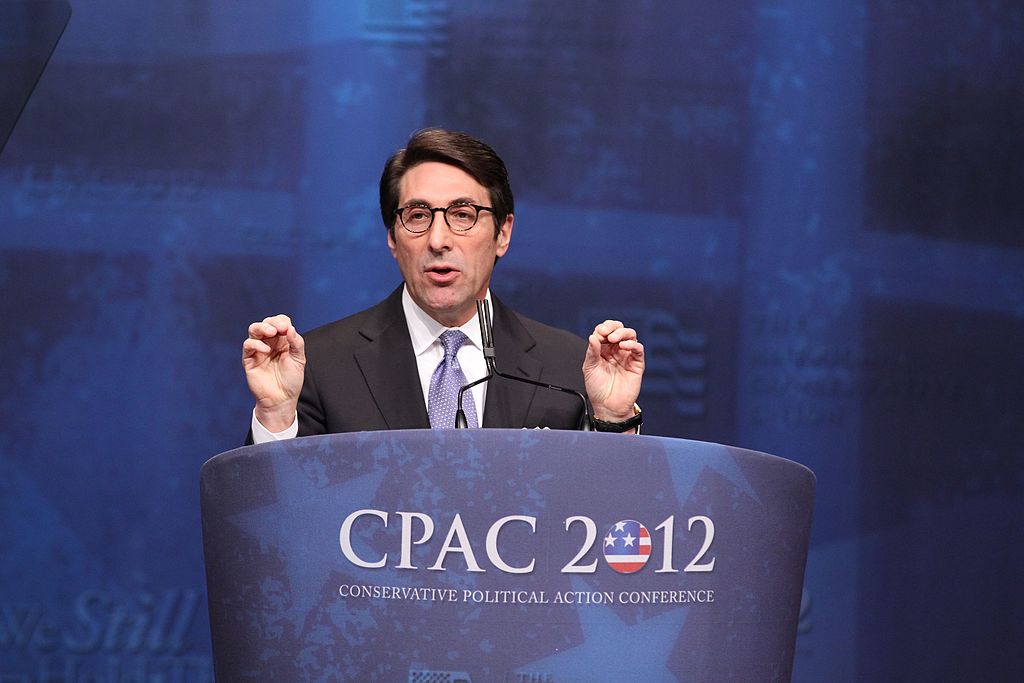
In many of the 27 states that have adopted anti-BDS measures, the main sponsors of those bills have been closely with ALEC. In Georgia, SB327 was co-sponsored by state Senator Judson Hill, who was named ALEC ‘Legislator of the Year’ just a few years earlier.[149] In Tennessee, SB1250 was introduced by state Senator Dolores Gresham, who has served on ALEC’s Education Task Force.[150] Similarly, in Indiana, HB1378 was authored by Representative Brian Bosma, who has served ALEC as a member of its Energy, Environment and Agriculture Task Force[151] and its Civil Justice Task Force.[152]
[149] American Legislative Exchange Council, “Sen. Judson Hill Awarded Legislator of the Year by the American Legislative Exchange Council,” press release, July 31, 2014, www.alec.org/press-release/sen-judson-hill-awarded-legislator-year-american-legislative-exchange-council.
[150] “ALEC Education Task Force Membership Directory, August 2011, obtained and released by Common Cause, referenced by the Center for Media and Democracy at www.sourcewatch.org/index.php/Tennessee_ALEC_Politicians#cite_note-EDUNOLA-1.
[151] “ALEC Energy, Environment, and Agriculture Task Force Membership Directory,” December 2010, obtained and released by Common Cause, referenced by the Center for Media and Democracy at www.sourcewatch.org/index.php/Indiana_ALEC_Politicians#cite_note-HHS_Letter-2.
[152] “Civil Justice Task Force Membership Directory,” August 2011, obtained and released by Common Cause, referenced by the Center for Media and Democracy at www.sourcewatch.org/index.php/Indiana_ALEC_Politicians#cite_note-HHS_Letter-2.
And two years after introducing ALEC to anti-BDS legislation as the group’s national chairwoman, Sen. Leah Vukmir introduced it to her own state legislature in Wisconsin in late 2017. The bill, co-authored by Vukmir, was signed into law in April 2018.[153] The Wisconsin bill, adopted as 2017 Act 248, prohibits all public entities from doing business with any entities that boycott Israel.
[153] Governor Scott Walker, “Governor Walker Reaffirms Support for Israel, Signs Anti-BDS Bill into Law,” press release, April 3, 2018, https://web.archive.org/web/20180414205254/https://walker.wi.gov/press-releases/governor-walker-reaffirms-support-israel-signs-anti-bds-bill-law.
A recent Guardian report revealed ALEC’s role in coordinating an upcoming dissemination of bills seeking to quell criticism of Israel in U.S. public schools and universities by labeling it as “antisemitic” or “discriminatory.” E-mails obtained by the Guardian show that Florida state Representative Randy Fine, who sponsored Florida’s own legislation, presented on his recent legislative accomplishment at ALEC’s annual conference held in August 2019. Fine was eager for the meeting’s attendees, which included state lawmakers from South Carolina, North Carolina, Arkansas, Kansas, and Oklahoma, to coordinate their own state legislative advocacy with the Israeli-American Coalition for Action, which he praised for supporting the legislative push in his own state.[154]
[154] Ed Pilkington, “Revealed: rightwing push to ban criticism of Israel on US campuses,” The Guardian, October 17, 2019 https://www.theguardian.com/us-news/2019/oct/16/conservative-activists-want-to-outlaw-antisemitism-in-public-education-why-is-that-a-bad-thing.
Responding to that email, a representative of the group boasted that their legal team had “refined [the bill] into a model that can be brought elsewhere,” and encouraged members to contact them or ALEC National Chairman Rep. Alan Clemmons of South Carolina for “policy support.”[155]
[155] Ibid.
Anti-BDS Laws’ Impact on People of Color
While it is clear that anti-BDS laws are a direct attack on the constitutionally-protected First Amendment right to boycott,[156] they are also just one tactic in a long legacy of attacks on the rights of Palestinians. The movement for Palestinian rights is broad and diverse, with supporters from all sectors of society. While the laws target Palestinian rights advocates writ large, Arab-American, Black, Brown, and Indigenous people who have been central to the growing cross-movement defense of the rights of Palestinians have also clearly been impacted.
[156] NAACP v. Claiborne Hardware, 458 U.S. 886 (1982): “The right of the States to regulate economic activity could not justify a complete prohibition against a nonviolent, politically motivated boycott…” and United States Supreme Court (1966): “[c]riticism of government is at the very center of the constitutionally protected area of free discussion.”
As in other struggles for justice, it is people of color that are disproportionately affected by backlash that movements face. For example, the Israeli government deems Black-Palestinian solidarity so threatening that it has attempted to implement a strategy to expressly target the Movement for Black Lives’ support for Palestinian rights.[157]
[157] See The Grey Zone, “Censored Documentary Exposes the Israeli Government’s Attacks on Black Lives Matter,” September 5, 2018: “‘The major problem with Israel is with the young generation of the black community — Black Lives Matter starts there,’ stated Judith Varnai Shorer, the Israeli consul general in Atlanta, Georgia,” https://thegrayzone.com/2018/09/05/censored-documentary-exposes-the-israeli-governments-attack-on-black-lives-matter/; see also Reut Group’s “Navigating Intersectional Landscapes: Rules for Jewish Community Professionals” report that fixates on the “threat of intersectionality movements” to Israel, released in June 2019, https://20a1ea9b-cbf6-4da3-88fd-ab21d8ba06cc.filesusr.com/ugd/001a60_f2414f5a7d404b69932f20a2319da618.pdf.
Students of color who support Palestinian rights have also found themselves singled out and targeted by right-wing extremistss like David Horowitz. He has been referred to by the Southern Poverty Law Center as “one of America’s most dangerous hatemongers” and “the godfather of the modern anti-Muslim movement”. Like other Islamophobic right-wing commentators, Horowitz frequently ties his anti-Muslim and anti-Black diatribes together with his hatred of Palestinians.[158] Horowitz has used posters and speeches to target students and professors of color who support Palestinian rights.[159] ALEC hosted Horowitz at its annual meeting in New Orleans in 2018. During a breakfast session, Horowitz claimed that “at the K-12 level, school curricula have been turned over to racist organizations like Black Lives Matter and terrorist organizations like the Muslim Brotherhood.”[160]
[158] Southern Poverty Law Center, “‘Intelligence Report –- Godfather,”’, May 24, 2014, https://www.splcenter.org/fighting-hate/intelligence-report/2014/godfather.
[159] Aviva Stahl, “Poster Campaign Calls Brooklyn College Students ‘Terrorist Supporters,”’ The Village Voice, October 3, 2017, https://www.villagevoice.com/2017/10/03/david-horowitz-is-putting-up-posters-calling-brooklyn-college-students-terrorist-supporters/.
[160] Chris Taylor, The Cap Times, “Rep.Chris Taylor: ALEC gathering gives platform to hatemongering Horowitz,” August 20, 2018, https://madison.com/ct/opinion/column/rep-chris-taylor-alec-gathering-gives-platform-to-hatemonger-horowitz/article_3002a085-1320-5b70-a278-9b935fae106c.html.
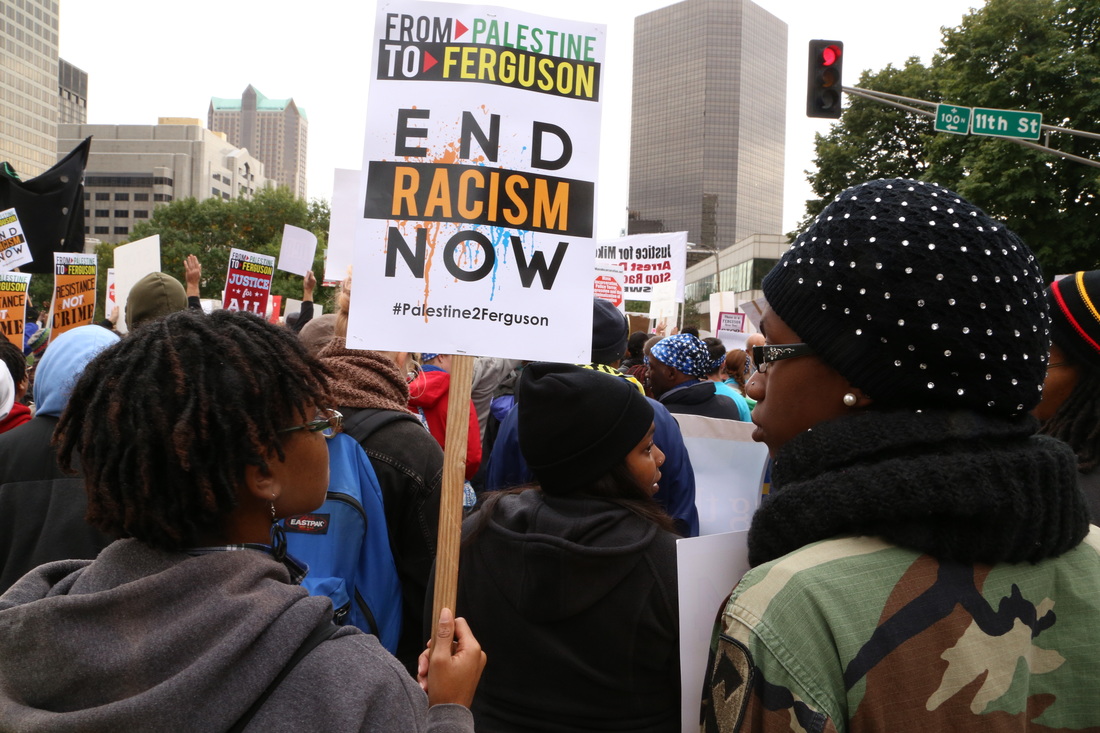
Online campaigns like those run on the Canary Mission website deliberately smear the reputations of people who advocate for the rights of Palestinians, and they overwhelming focus on people of color. The Palestinian rights advocacy organisation, Jewish Voice for Peace, reported on the shadowy activities of Canary Mission and found that “[t]he students targeted by Canary Mission are overwhelmingly Palestinian, Arab, Muslim and/or students of color”. The report continued, “in a national climate marked by rising Islamophobia, anti-Arab and anti-black racism, Canary Mission’s smear campaign only adds fuel to the fire, exposing already marginalized campus communities to additional surveillance, harassment and even physical danger.”[161]
[161] Jewish Voice for Peace, “Shadowy Website Creates Blacklist of Pro-Palestinian Activists”, May 13, 2016, https://jewishvoiceforpeace.org/canary-mission/.
These and many other examples of the widespread attack on Palestinian rights advocates and their allies are compounded by the wave of anti-BDS laws that has occured in recent years. The analysis of the impact of these laws must be seen together with this wider animus directed toward Muslims and people of Arab descent, particularly Palestinians and Palestinian-Americans.
Anti-BDS laws chill, punish, or attempt to punish speakers supporting Palestinian rights... designed to silence expressive advocacy that challenges the injustices of Israeli state policy
Consider the impact of a 2017 Texas law, sponsored by Phil King, who was National Chair of ALEC in 2015 and is a member of the Board of Directors.[162] The 2017 law stipulated that “a governmental entity may not enter into a contract with a company for goods or services unless the contract contains a written verification from the company that it: (1) does not boycott Israel; and (2) will not boycott Israel during the term of the contract.” A Palestinian-American speech language pathologist, who was born in Austria but has lived in the U.S. for thirty years, has worked in Austin suburban schools serving Arabic-speaking students since 2009. She was unable to renew her contract with the school district because she could not, in good conscience, sign the required certification that she does not and will not boycott Israel.[163] Speaking in a media interview, Ms. Amawi said, “You know I have to set an example for my kids. We have got to stand up for justice, and what’s right and equal opportunity for everybody… so I could not sign it. I was forced to resign from my job because I will not sign it.”[164] Zachary Abdelhadi, a student at Texas State University, is another Palestinian-American impacted by the Texas law. Because he would not submit to the law, he was prevented from judging high school debate tournaments for the Lewisville Independent School District. Similarly, Obinna Dennar, a Ph.D History student, had to turn down payment for judging a debate in the Klein independent school district.
[162] American Legislative Exchange Council, “Rep. Phil King,” www.alec.org/person/representative-phil-king; Phil King campaign website, www.philking.com/about.
[163] Complaint at ¶¶ 4, 27-28, 30, 32-33, Amawi v. Pflugerville Indep. Sch. Dist., No. 18-cv-01091 (W.D. Tex. Dec. 16, 2018), https://www.documentcloud.org/documents/5631742-Bahia-Amawi-s-Lawsuit-Against-Texas-Over-Israel.html; see also Glenn Greenwald, “A Texas Elementary School Speech Pathologist Refused to Sign a Pro-Israel Oath, Now Mandatory in Many States — so She Lost Her Job,” The Intercept, Dec. 17, 2018, https://theintercept.com/2018/12/17/israel-texas-anti-bds-law/.
[164] “School Speech Pathologist in Texas Terminated For Refusing to Sign Israel Oath,” video interview with Bahia Amawi, The Intercept, December 17, 2018, https://youtu.be/f_j5pNTGnkM.
These anti-BDS laws chill, punish, or attempt to punish speakers supporting Palestinian rights. They are part of a tapestry of laws and practices, of which the Texas anti-BDS Act is a central piece, which are designed to silence expressive advocacy that challenges the injustices of Israeli state policy. Beyond the attack that anti-BDS laws have on people of color, the broad nature of how anti-BDS laws are applied can have devastating consequences. For example, based on a mistaken application of the Texas anti-boycott law, hurricane victims in Dickinson, Texas were required to pledge not to boycott Israel as a condition for receiving relief aid.[165]
[165] Kyle Swenson, “This Texas town offers hurricane relief — if your politics are right,” Washington Post, Oct. 20, 2017, https://www.washingtonpost.com/news/morning-mix/wp/2017/10/20/texas-town-makes-hurricane-harvey-aid-applicants-pledge-not-to-boycott-israel/. Following an outcry, city officials clarified that individual homeowners were exempt from the requirement. https://www.nbcnews.com/news/us-news/harvey-relief-program-nixes-requirement-not-boycott-israel-n814796; https://www.npr.org/sections/thetwo-way/2017/10/20/559070267/need-hurricane-aid-in-one-texas-city-if-you-boycott-israel-you-may-be-out-of-luc.
While anti-BDS laws impact the everyday lives of the people of color, and their allies, who take a stand to defend the rights of Palestinians, they exist within this broader social and political context. These laws are only one component of the broader attack on the movement for Palestinian rights that undermines the rights of all people to boycott not only in support of the rights of Palestinians, but other social justice issues as well.
Critical Infrastructure Bills
The Origin
In August 2016, Indigenous and allied protesters began an effort to prevent construction of the Dakota Access Pipeline (DAPL) that soon evolved into a national movement referred to as #NoDAPL. Historian and Indigenous activist Nick Estes documented his involvement with #NoDAPL in his 2019 book Our History Is the Future, which contains, among many other important stories, details of the motivations and significance of this movement:
This was my fourth and final trip to Oceti Sakowin Camp, the largest of several camps that existed at the confluence of the Cannonball and Missouri Rivers, north of the Standing Rock Indian Reservation, from April 2016 to February 2017. Initially, the camps had been established to block construction of Energy Transfer Partners’ $3.8 billion Dakota Access Pipeline (DAPL), a 1,712-mile oil pipeline that cut through unceded territory of the 1868 Fort Laramie Treaty and crossed under Mni Sose (the Missouri River) immediately upstream from Standing Rock, threatening the reservation’s water supply. This was not just about Standing Rock water: The pipeline crossed upriver from the Fort Berthold Indian Reservation on the Missouri River, transporting oil extracted from that reservation’s booming fracking industry. It cut under the Mississippi River at the Iowa-Illinois border, where a coalition of Indigenous peoples and white farmers, ranchers, and environmentalists in Iowa opposed it. And it crossed four states – North Dakota, South Dakota, Iowa, and Illinois. But it was Standing Rock and allied Indigenous nations, including Fort Berthold, who had put up the most intense resistance…. The encampments were about more than stopping a pipeline. Scattered and separated during invasion, the long-awaited reunification of all seven nations of Dakota-, Nakota-, and Lakota-speaking peoples hadn’t occurred in more than a hundred years, or at least seven generations.[166]
[166] Nick Estes, Our History Is the Future (New York: Verso, 2019), 2-3.
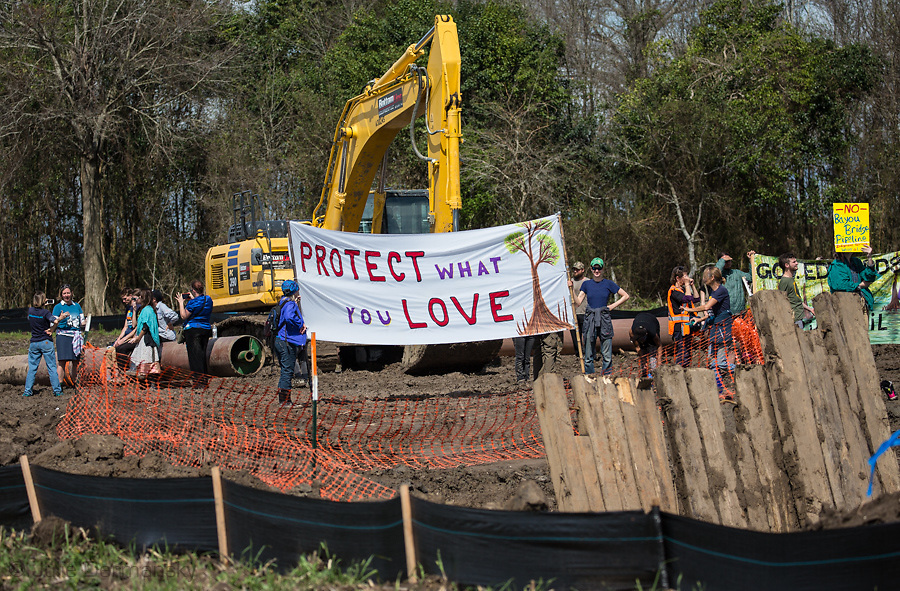
The movement was quickly misrepresented by Republicans, law enforcement officials, and right-wing commentators who supported a quick and uninterrupted construction of the 1,172-mile-long underground oil pipeline. State-level legislators across the country harnessed the backlash as justification for new laws that criminalize protest activity with extreme penalties.[167]
[167] While a host of critical-infrastructure-related bills targeting protest have existed at least since Louisiana passed Act 157 in 2004, the most recent wave of progressively more punitive state laws began appearing on the heels of the #NoDAPL protests. See generally: Connor Gibson, “State Bills to Criminalize Peaceful Protest of Oil and Gas ‘Critical Infrastructure’,” Polluter Watch, February 18, 2019, https://polluterwatch.org/State-Bills-Criminalize-Peaceful-Protest-Oil-Gas-Critical-Infrastructure-pipelines.
On Feb 22nd 2017, the chair of the Oklahoma House of Representatives Committee on Criminal Justice and Corrections, Rep. Scott Biggs, introduced a critical infrastructure bill, HB 1123, to the committee, expressly stating in response to a question by another committee member, “Yes, [the Dakota Access Pipeline protests] are the main reason behind this.”[168] During debate of the bill in the committee session, Rep. Biggs invited members to join oil and gas executives for a committee briefing on what took place in North Dakota.[169]
[168] Oklahoma House of Representatives, https://sg001-harmony.sliq.net/00283/Harmony/en/PowerBrowser/PowerBrowserV2/20170222/-1/7904?mediaStartTime=20170222102919&mediaEndTime=20170222110755&viewMode=3, Timestamp: 10.45.36 a.m., “Yes, [the Dakota Access Pipeline protests] is the main reason behind this”; see full exchange between 10.40.15 a.m.-10.45.40 a.m.
[169] Ibid.
The law created a new set of criminal offenses for trespassing on property containing “a critical infrastructure facility,” a term defined broadly by the bill as any of 16 mostly energy-related industrial manufacturing facilities, or, in a clear allusion to the Dakota Access Pipeline, “[a]ny aboveground portion of an oil, gas, hazardous liquid or chemical pipeline, tank, railroad facility or other storage facility” marked as private property.[170] The offenses carried a tremendous penalty: entering property that has on it a critical infrastructure facility could result in a fine of $1,000 and/or six months in jail, and causing damage on such property could lead to 10 years in prison and a fine of up to $100,000. [171]
[170] American Legislative Exchange Council, “Critical Infrastructure Protection Act,” https://www.alec.org/model-policy/critical-infrastructure-protection-act/.
[171] International Center for Not-For-Profit Law, “US Protest Law Tracker,” http://www.icnl.org/usprotestlawtracker/?location=&status=enacted,enacted_with_improvements&issue=6&date=&type=.
House Bill 1123 was signed into law by Oklahoma Governor Fallin on May 3, 2017. Less than two weeks later, Governor Fallin signed another bill into law, HB 2128, to ramp up financial liability for individuals convicted of trespassing and for others who conspired with them.[172]
[172] Ibid. For analysis: http://webserver1.lsb.state.ok.us/cf_pdf/2017-18%20ENR/hB/HB2128%20ENR.PDF.
The Role of ALEC
A few months after Oklahoma passed HB 1123 and HB 2128 into law, ALEC’s Energy, Environment and Agriculture Task Force drafted what it called the “Critical Infrastructure Protection Act.”[173] ALEC introduced it as a model bill soon after, at its States and Nation Policy Summit in Nashville, December 7-9, 2017. In a letter sent by six fossil fuel industry associations, lobbyists, and corporations to state lawmakers on December 7, 2017, timed to coincide with ALEC’s meeting, the groups called on state lawmakers to support ALEC’s new Critical Infrastructure legislation, arguing it would hold individuals and organizations accountable for tampering with or disrupting operations. The fossil fuel groups added that they looked “forward to working with you as you continue to address this growing problem in your state.”[174]
[173] American Legislative Exchange Council, “Critical Infrastructure Protection Act,” https://www.alec.org/model-policy/critical-infrastructure-protection-act/.
[174] “An industry letter ALEC sent to state lawmakers,” uploaded to Scribd by Alexander Kaufman, 2, https://www.scribd.com/document/371677094/ALEC-letter.
A few weeks later, Grant Kidwell, director of ALEC’s Energy, Environment and Agriculture Task Force, wrote an article for ALEC’s website. In the piece, Kidwell specifically cited pipeline protestors’ activities against Energy Transfer Partners’ Dakota Access Pipeline as justification for the need for critical infrastructure laws. He also drew an explicit connection between Oklahoma’s laws and the ALEC model legislation:
States have begun to take action in response to this disturbing trend of trespassing, vandalism, and damage to critical infrastructure sites. In 2017, Oklahoma enacted two new laws designed to hold individuals and conspiring organizations criminally and civilly liable for trespassing or tampering with critical infrastructure sites and structures. Members of the American Legislative Exchange Council drew on these two laws for the crafting of a new piece of model policy, the Critical Infrastructure Protection Act.[175]
[175] Grant Kidwell, American Legislative Exchange Council, “Protecting Everyday Life Means Protecting America’s Infrastructure,” January 24, 2018, https://www.alec.org/article/protecting-everyday-life-means-protecting-americas-infrastructure/.
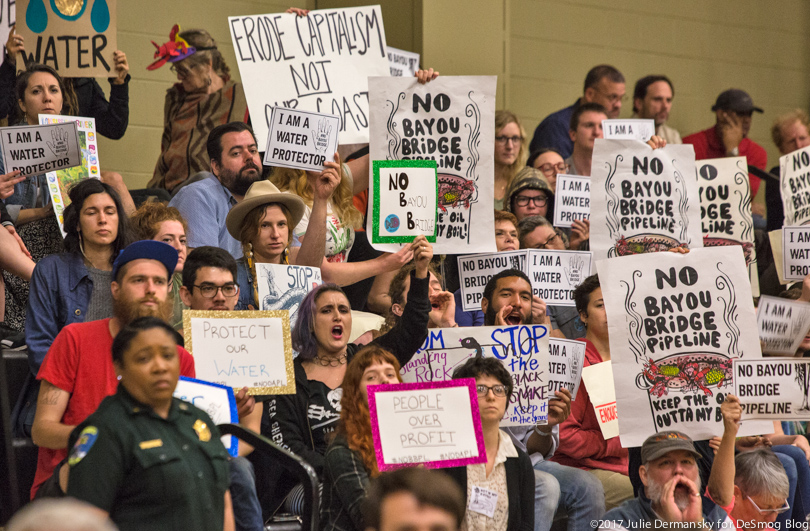
On March 26, 2018, Major Thibaut, Jr., an ALEC-affiliated Democratic Louisiana state legislator,[176] introduced House Bill 727 to the state’s House of Representatives. Justifying the need to amend the critical infrastructure bill, Thibaut told a reporter, “I saw what happened in parts of the country like North Dakota. Oklahoma has some legislation, and this is kind of modeled after that.”[177] The bill was introduced soon after protesters in Louisiana, inspired by earlier protests at Standing Rock, had established a campaign to halt construction of the 163-mile-long Bayou Bridge oil pipeline by two ALEC-affiliated corporations,[178] Energy Transfer Partners and Phillips 66.[179] Thibaut may also have had in mind that Phillips 66 (and the company it was formerly owned by, ConocoPhillips[180]) had made donations to his political campaign for several years, including the year just prior to his bill passing into law.[181] His close ties to the companies building the critical infrastructure facilities is part of a much larger trend: the National Institute on Money in Politics and Greenpeace have revealed that since 2011, 65 elected representatives who signed on as co-authors of the Louisiana Senate and House critical infrastructure bills received $54,851 in contributions from the two companies building the Bayou Bridge Pipeline.[182]
[176] Ethics Disclosure filed by State Rep. Joseph H. Major Thibeault, Jr., Report No. 22148, filed February 1, 2011, 49.
[177] Alleen Brown and Will Parrish, “Louisiana and Minnesota introduce anti-protest bills amid fights over Bayou Bridge and Enbridge pipelines,” The Intercept , February 21, 2018, https://theintercept.com/2018/03/31/louisianaminnesota-anti-protest-bills-bayou-bridge-enbridge-pipelines.
[178] Nick Surgey, Coal and Oil Polluters Dominate ALEC Conference, PRWatch, July 31, 2014, https://www.prwatch.org/news/2014/07/12557/polluters.
[179] L’eau Est La Vie Facebook page, https://www.facebook.com/LeauEstLaVie/.
[180] Mary Conroy, “Phillips 66 (PSX) Versus ConocoPhillips (COP),” Investopedia, July 24, 2016,
[181] Ethics Disclosure filed by state Rep. Joseph H. Major Thibeault, Jr., Report No. 34733, filed February 7, 2013,
[182] “Oil and Gas Contributions to Legislators Sponsoring Oil & Gas ‘Critical Infrastructure’ Anti-Protest Bills, 2015-2018,” Google Doc, https://docs.google.com/spreadsheets/d/1Nz0H8yTjyqwtlB_TYwxuq77vFEInAndwuZlNr7a51p0/edit#gid=1498139062. See generally, Connor Gibson, “State Bills to Criminalize Peaceful Protest of Oil and Gas ‘Critical Infrastructure’,” Polluter Watch, February 18, 2019, https://polluterwatch.org/State-Bills-Criminalize-Peaceful-Protest-Oil-Gas-Critical-Infrastructure-pipelines and FollowTheMoney.org, https://www.followthemoney.org/.
In 2019, just months after ALEC adopted Oklahoma’s bill as model legislation, North Dakota, South Dakota, Texas, and Tennessee all passed critical infrastructure laws. In Missouri, a critical infrastructure bill has passed both houses of government and is awaiting approval by the governor. There are also critical infrastructure bills pending in Idaho, Illinois, Kentucky, Minnesota, and Ohio.[183]
[183] International Center for Not-For-Profit Law, “US Protest Law Tracker,” http://www.icnl.org/usprotestlawtracker/?location=&status=enacted,enacted_with_improvements&issue=6&date=&type=.
The Center for Media and Democracy has also documented ALEC affiliations for sponsors of the bills passed into law in other states, including North Dakota (Sen. Janne Myrdal, Rep. Chuck Damschen, and Rep. Jim Schmidt),[184] South Dakota (Sen. Kris Langer, Sen. Ryan Maher, committee Vice Chair Sen. Jenna Netherton, and Sen. Al Novstrup)[185] and Tennessee (Sen. Frank Nicely).[186] In Texas, two of the three sponsors of the state’s critical infrastructure bill, passed in spring 2019, have documented ALEC ties. [187]
[184] Center for Media and Democracy, “North Dakota ALEC Politicians,” SourceWatch, https://www.sourcewatch.org/index.php/North_Dakota_ALEC_Politicians.
[185] Center for Media and Democracy, “South Dakota ALEC Politicians,” SourceWatch, https://www.sourcewatch.org/index.php/South_Dakota_ALEC_Politicians.
[186] Center for Media and Democracy, “Tennessee ALEC Politicians,” SourceWatch, https://www.sourcewatch.org/index.php/Tennessee_ALEC_Politicians.
[187] Connor Gibson, “Texas – Oil and Gas ‘Critical Infrastructure’ Anti-Protest Bills,” Polluter Watch, March 25, 2019, https://polluterwatch.org/TEXAS-Oil-Gas-Critical-Infrastructure-Anti-Protest-Bills-alec-csg.
Critical Infrastructure Laws’ Impact on People of Color
As illustrated above, the Louisiana law emerged in the wake of the #NoDAPL movement, as part of a coordinated national effort by fossil fuel industry interests, supported by ALEC, to criminalize environmental and Indigenous protests against their infrastructure projects. It is therefore no coincidence that, just days after it was enacted, the Louisiana law was invoked by a private security company working in tandem with local law enforcement at the behest of the private corporations building the Bayou Bridge pipeline.[188]
[188]Center for Constitutional Rights, White Hat v. Landry case page, https://ccrjustice.org/home/what-we-do/our-cases/white-hat-v-landry.
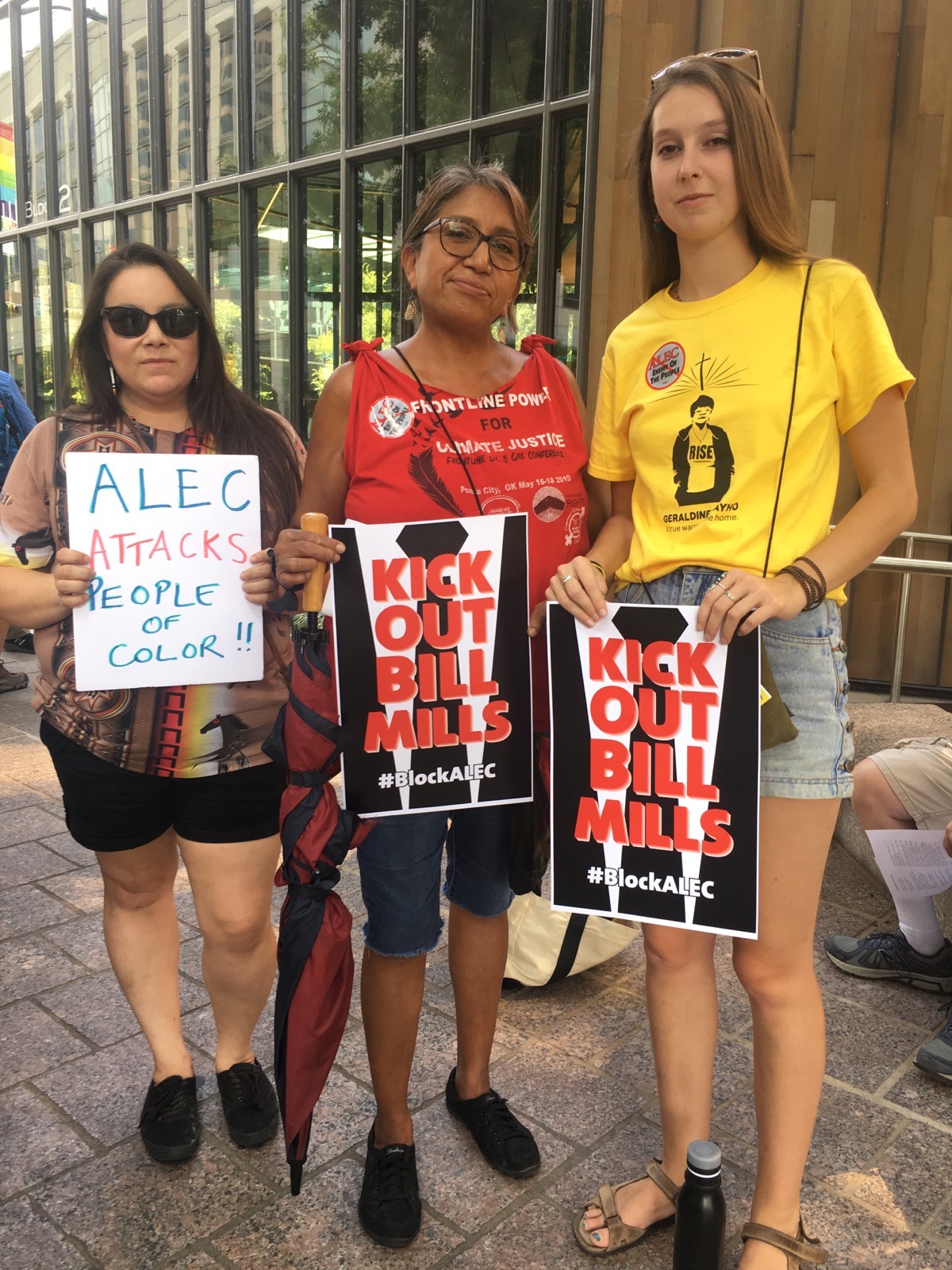
Anne White Hat, one of the Indigenous women who have been central to the leadership of the campaign to stop construction of the Bayou Bridge Pipeline in Louisiana, said of the law:
[189] Center for Constitutional Rights, “New Lawsuit Challenges Anti-Protest Trespass Law,” press release, May 22, 2019, https://ccrjustice.org/home/press-center/press-releases/new-lawsuit-challenges-anti-protest-trespass-law.
Meg Logue, a local activist with 350 New Orleans, said of the law, “ALEC-inspired HB 727 was a thinly veiled attempt to equate the peaceful, prayerful resistance of water protectors to terrorism, and hyper-criminalize our work accordingly. Our legislators jeopardize our democracy by bending toward the priorities of corporations while undermining the people’s right to self-determination and justice.”[190]
[190] Common Cause, “Before Annual ALEC Conference, New Report Exposes Secretive Group’s Political Influence in Louisiana,” press release, August 6, 2018,
As detailed in Section 3, the initial draft of House Bill 727 contained amendments to Louisiana’s critical infrastructure law that were even more draconian than either the Oklahoma or ALEC model legislation. For example, HB 727 included a far-reaching conspiracy offense which provided that if two or more persons conspired to commit unauthorized entry (heretofore a misdemeanor trespass), even without actually committing the trespass, they could be imprisoned with or without hard labor for up to five years and fined up to $10,000.[191]
[191] Complaint at ¶¶ 50, White Hat v. Landry, no. pending (M.D. LA, May 22, 2019), https://ccrjustice.org/sites/default/files/attach/2019/05/White%20Hat%20v%20Landry%20Complaint.pdf.
As the bill progressed through the House and Senate in Louisiana, opponents of the bill began to raise serious doubts about it. Another climate activist with 350 New Orleans, Alicia Cooke, told a reporter covering the situation, “How do you prove that someone is conspiring to trespass on property? Versus conspiring to gather near property?”[192] The many concerns raised by opponents of the bill, particularly the conspiracy component, resulted in this provision, and others, being removed before passage.
[192] Christine Baniewicz, “Under Louisiana Bill, Peaceful Protesters Could Face 20 Years in Prison,” Truthout, April 18, 2018, https://truthout.org/articles/under-louisiana-bill-peaceful-protesters-could-face-20-years-in-prison/.
Unlike the Oklahoma law, HB 727 contains no outer bounds to its definition of pipelines, and thus includes all portions of the 125,000 miles of pipelines in the state, most of which run underground.[193] According to a legal challenge to HB 727, filed by the Center for Constitutional Rights in support of Anne White Hat, 350 New Orleans, and others, the open-ended and far-reaching definition not only lends itself to misuse by law enforcement as a pretext for targeting a wide range of protest activity, but renders the law unconstitutionally vague and overbroad.[194]
[193] Complaint at ¶¶ 49, White Hat v. Landry.
[194] Ibid, ¶¶ 55.
White Hat, who is also the lead plaintiff in the aforementioned case, was arrested on September 18, 2018, after leading a prayer ceremony at a boat launch near St. Martinville, Louisiana. She was charged with two felony counts under the critical infrastructure law for unauthorized entry that allegedly occurred on September 3, 2018, near a pipeline construction site in the Atchafalaya Basin. As outlined in the court filing:
White Hat had been present on the property in question as a Water Protector with the permission of co-owners. She engaged in non-violent protest against and monitoring of the pipeline project and was trying to raise awareness about the fact that the pipeline was being constructed on the property illegally, a fact later confirmed as the company was found by a Louisiana court to have been trespassing at the time. White Hat is currently facing the possibility of prosecution for the two felony charges that are subject to a combined 10 years imprisonment. The pending charges have affected her life and her ability to engage in further demonstrations.[195]
[195] Complaint at ¶¶ 19, White Hat v. Landry.
So far, more than a dozen arrests have been made of peaceful protesters, as well as a journalist covering the events, who were charged with felonies for acts that would have been charged as misdemeanor trespass before August 1, 2018 (and only if those arrested did not have permission or a legal right to remain on the property in the first place). They now face the possibility of prosecution and, if found guilty, up to five years in prison (per offense) and heavy fines. Many of these arrests took place on property upon which a court in December 2018 ruled that the pipeline company itself was trespassing,[196] while the protesters had obtained permission of co-owners of the property to be there.
[196] Bayou Bridge v. Carline, Docket No. 87011, 16th Judicial District, Parish of St. Martin, Louisiana, https://ccrjustice.org/sites/default/files/attach/2018/12/Reasons%20for%20Judgment--Bayou%20Bridge%20Pipeline%20vs%20Carline%20et%20al.pdf.
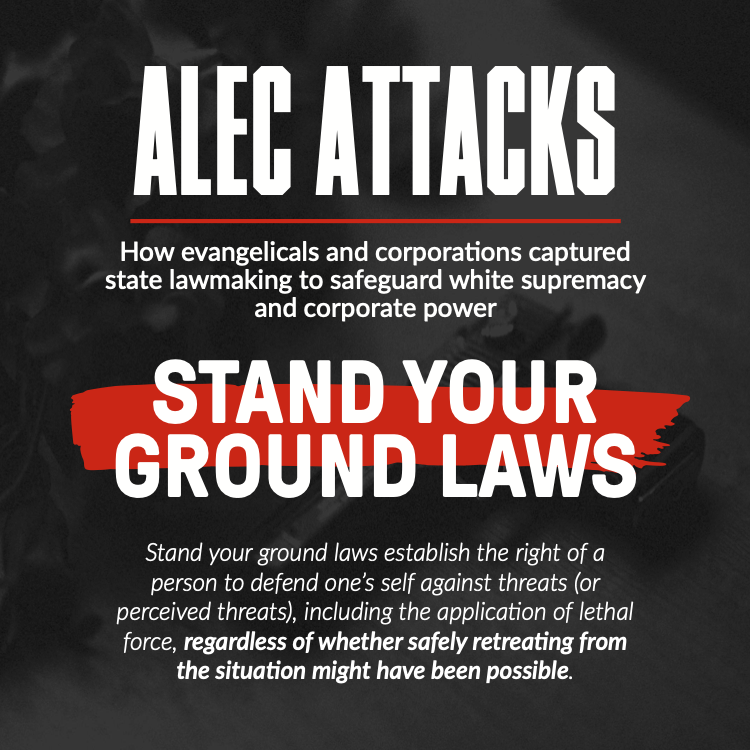
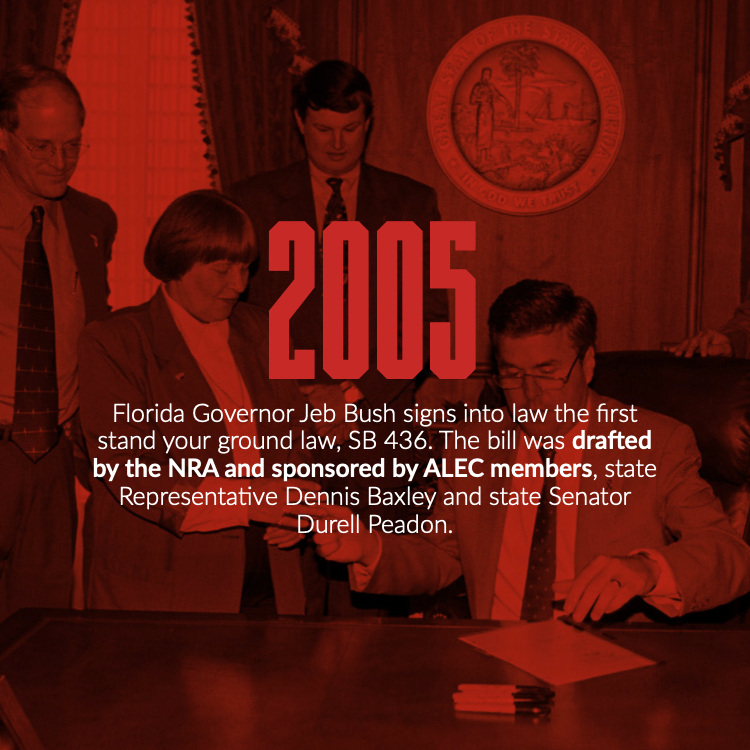
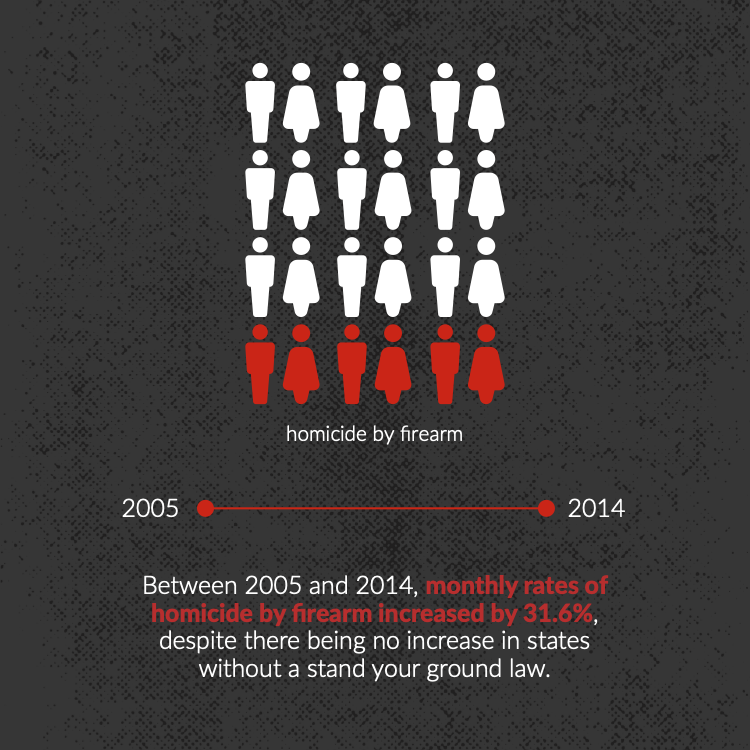
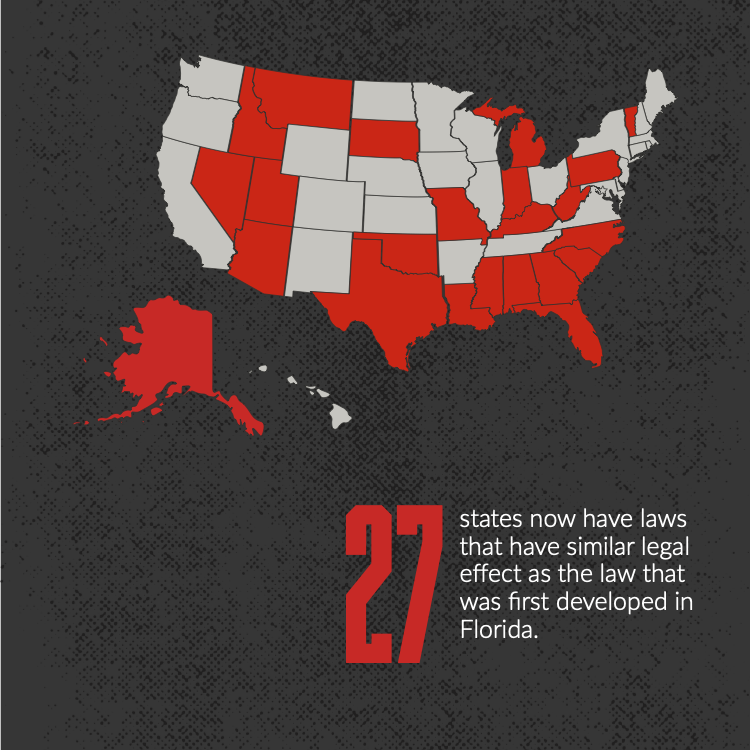
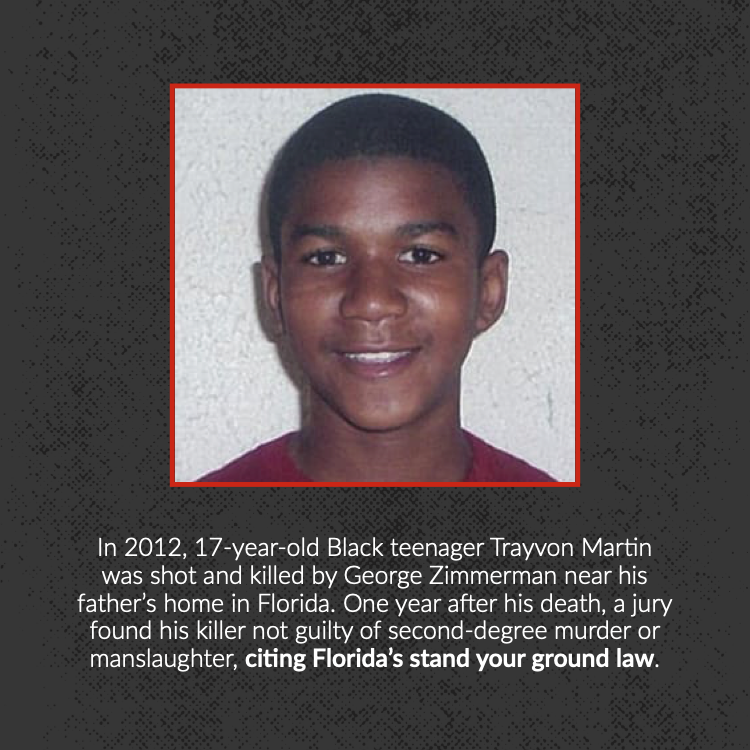
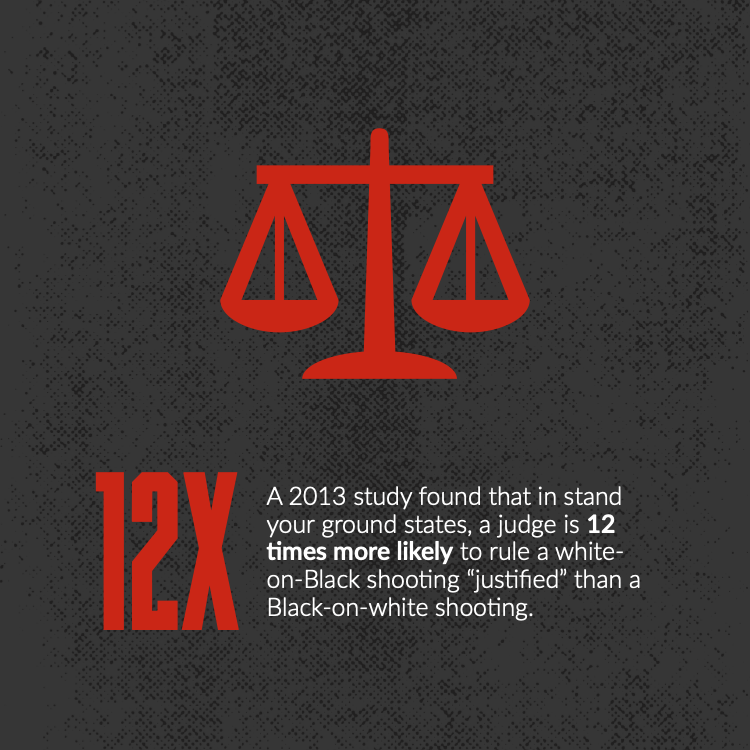
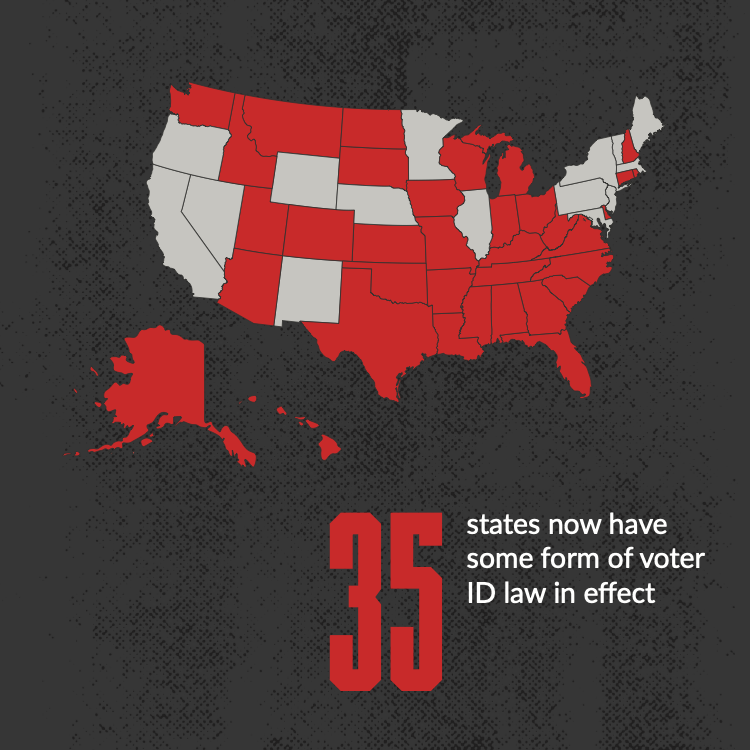
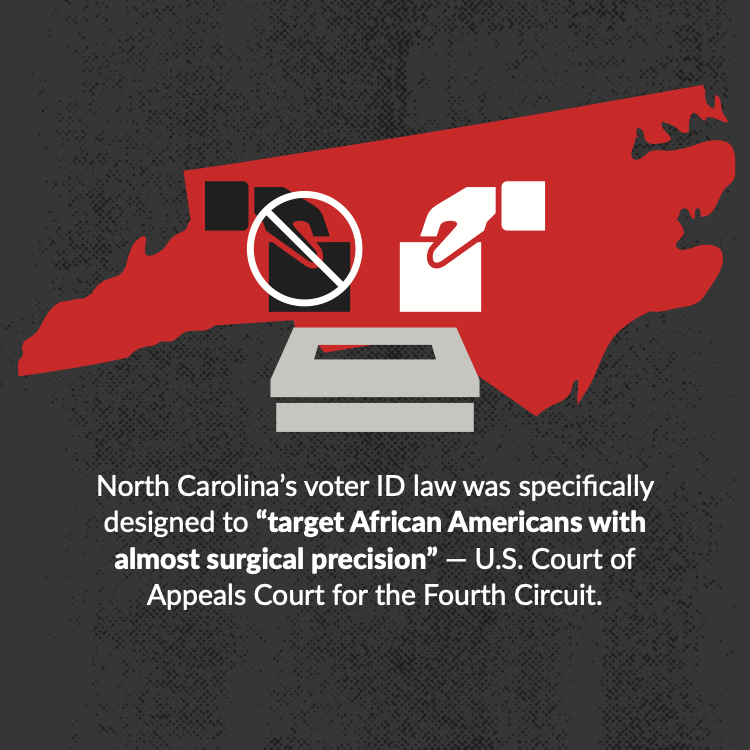
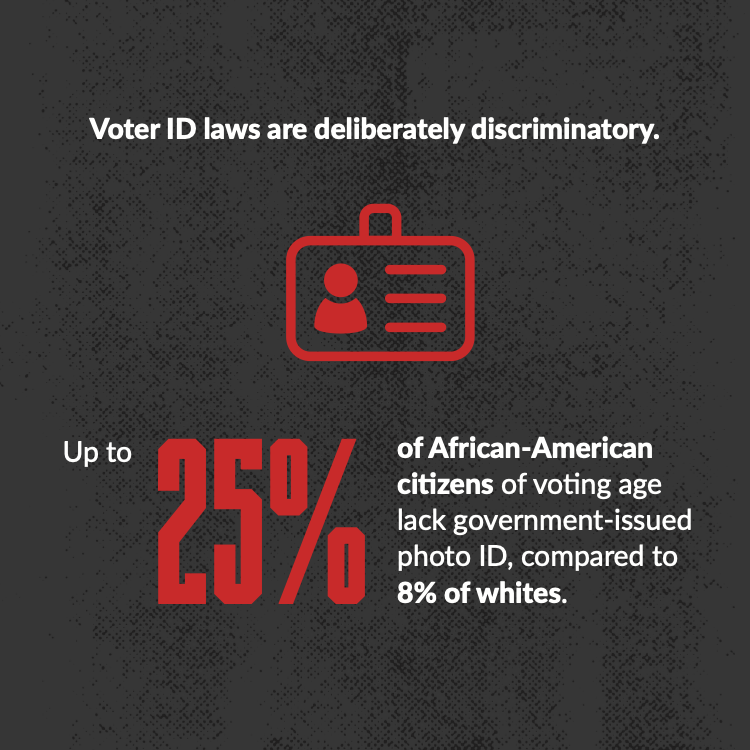
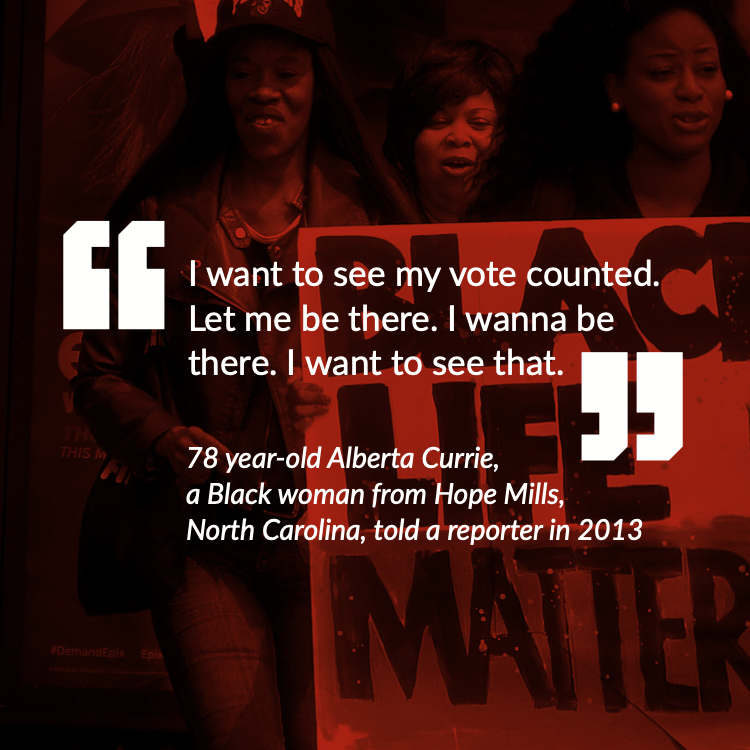
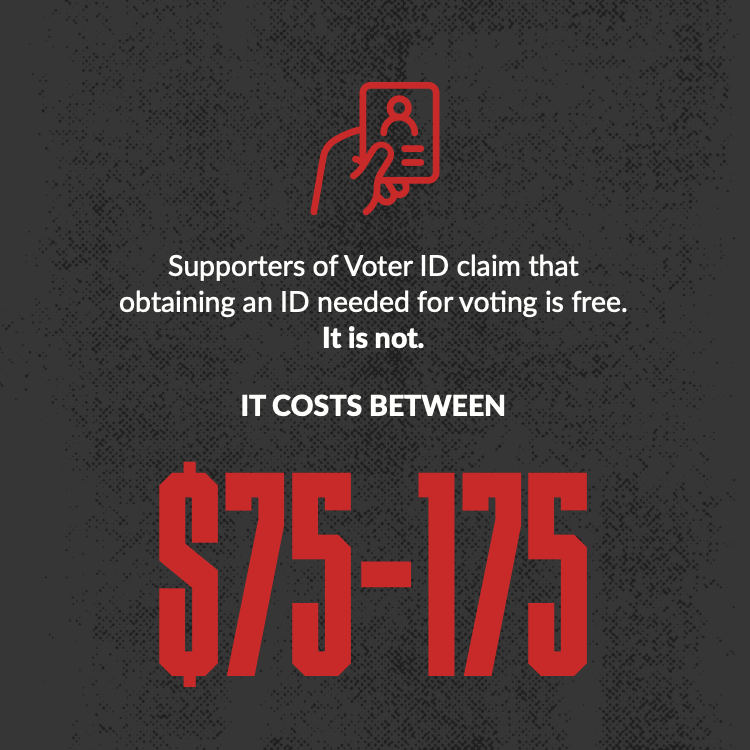
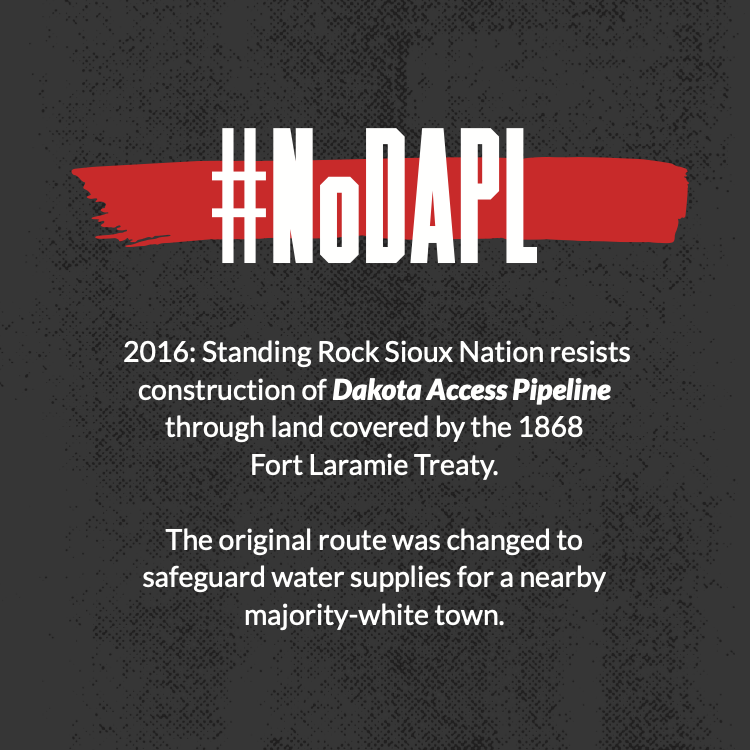
![“The Dakota Access Pipeline protests are the main reason behind this [critical infrastructure] law.” -- Rep. Scott Biggs, Oklahoma lawmaker justifying new law to punish water protectors](https://www.alecattacks.org/sites/default/files/assets/sliders/critical_2.png)
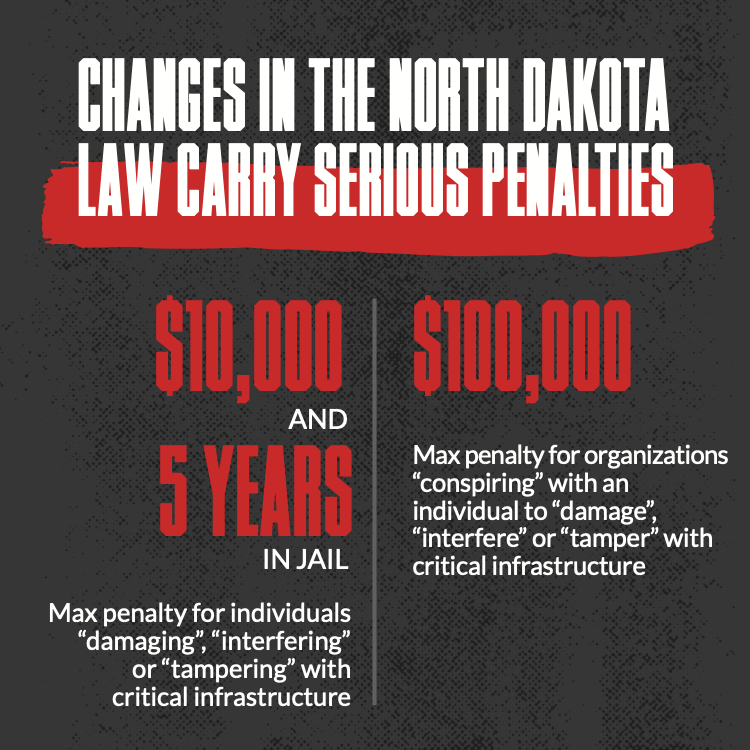
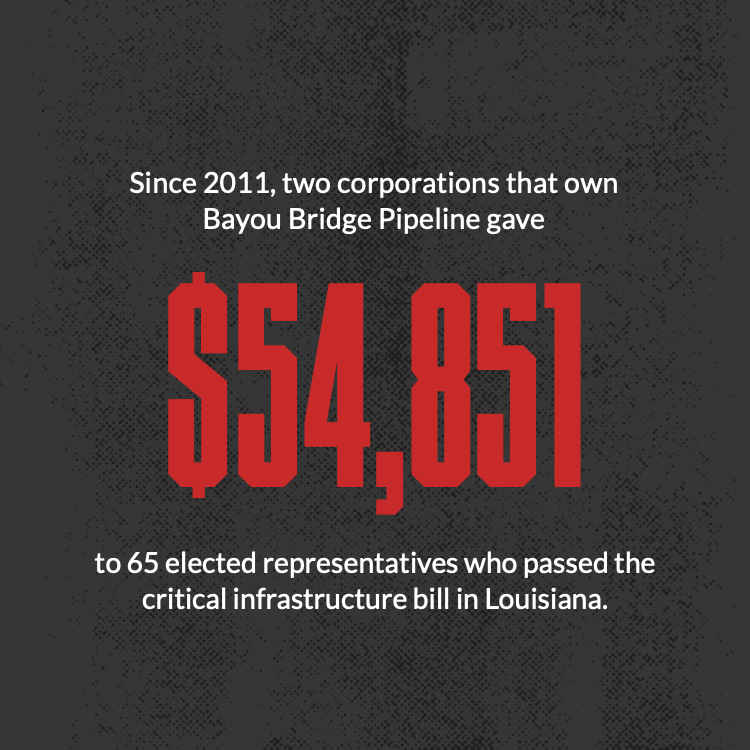
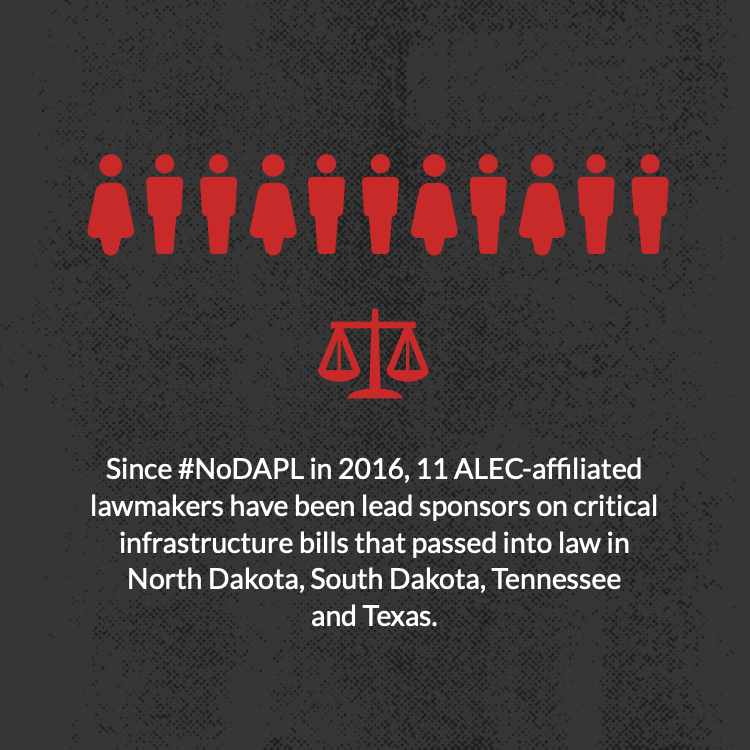
![The goal of this unconstitutional [critical infrastructure] law is to further corporate interests and silence Indigenous and allied non-Indigenous communities.](https://www.alecattacks.org/sites/default/files/assets/sliders/critical_6.png)
